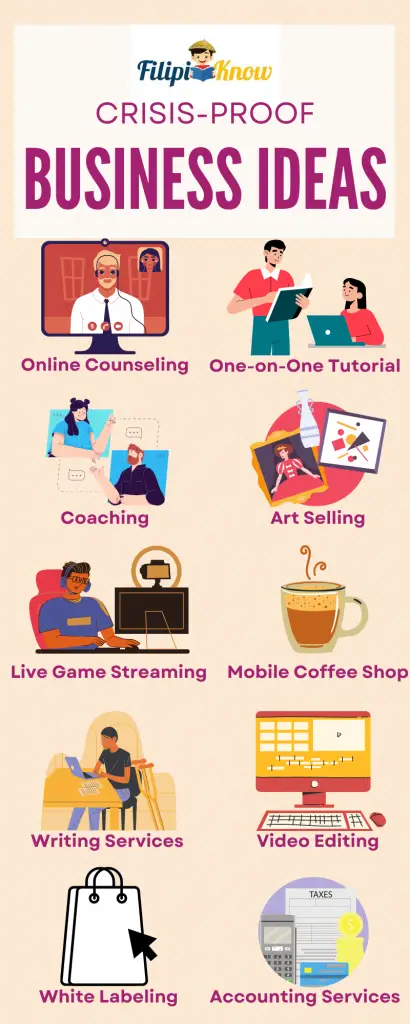Best Business Ideas in the Philippines With ₱50,000 Capital (or Less)

Whether you’re a college student looking for extra income, a corporate employee who is sick of running the rat race, or a housewife who wants to supplement your husband’s income, finding a winning business idea is the first step towards achieving financial freedom.
However, it’s easier said than done. That’s why we’ve scoured magazines, books, and the internet to compile a list of profitable business ideas in the Philippines that only require a small capital of ₱50,000 or less.
Related Article: How to Get a Part-time Job Online in the Philippines: An Ultimate Guide
Table of Contents
At a Glance: Top 10 Pandemic- and Recession-Proof Business Ideas in the Philippines

1. Online Therapy or Counseling
Overview: Online therapy provides mental health services mostly through video conferencing.
Why it is Pandemic and Recession-Proof:
According to a recent assessment conducted by the World Health Organization, almost 3.6 million Filipinos suffer from depression and anxiety1. With the increasing number of people struggling mentally and emotionally, there is also a growing demand for licensed professionals who can address these problems.
Capital: ₱20,000 to ₱50,000 for video conferencing needs. ₱150,000 to ₱300,000 if you’re building your website for booking appointments, patient databases, and online payments.
Ideal for: Licensed psychiatrists and psychologists.
Pros:
- A lot of working professionals and business people are looking for therapists due to stress from work and family.
- The chances of returning clients are high if they like your approach.
- The average charge per client ranges from ₱1,500 to ₱3,000 for each session.
Cons:
- There is a constant need to maintain your website for a better user experience.
- Issues with internet connectivity may arise.
- Patients go to therapists with proven track records.
2. One-on-One Academic Tutorial
Overview: One-on-one tutorials offer a personalized and more focused way of providing academic support to students struggling in class or just aiming to excel.
Why it is Pandemic and Recession-Proof:
Virtual learning is safe, but it is not always effective for children who mostly have short attention spans2. For this reason, many working parents are looking for tutors who can monitor and support their child’s academic performance.
Capital: ₱1,000 to ₱5,000 for educational materials and resources.
Ideal for: Anyone who has the means and patience to teach children.
Pros:
- There is a higher chance of getting clients who pay well because most of them are working professionals.
- The things you will teach are topics you already know or have an idea about.
- You don’t need to be an expert to start tutoring.
Cons:
- You need more patience.
- Children are easily distracted, so you have to be creative to keep their attention.
- There is a safety concern if your student is hyperactive.
3. Mentoring or Coaching for a Specific Field
Overview: Coaching services provide additional support to individuals looking to improve their business or skills.
Why it is Pandemic and Recession-Proof:
The coaching industry has grown over the years with the majority focusing on business and life coaching3. With a growing demand for highly skilled workers, people have also been seeking ways to learn valuable skills that will make them marketable in the long run.
Ideal for: Professionals or aspiring specialists in a sought-after field like Web Development, Digital Content Marketing, Accounting, Finance, E-Commerce, and Online Content Creation.
Capital: ₱20,000 to ₱50,000 for laptop or computer setup.
Pros:
- You learn more by teaching others.
- You can build connections within your field.
- People pay to learn your skills.
- You can create your package and sell it online.
Cons:
- Internet connectivity and technical issues.
- It takes time to build your portfolio for people to trust you.
4. Art Selling
Overview: An art business is when you sell art to collectors or accept commissions for your original work.
Why it is Pandemic and Recession-Proof:
People buy art for its emotional value. It is also a long-term investment for collectors who see art as an expensive commodity4. And although the global art market suffered a 22%5 loss in 2020, emerging digital artists continue to earn thousands of dollars in virtual auctions6.
Capital: ₱3,000 to ₱50,000 for art supplies and editing software.
Ideal for: Skilled or aspiring artists.
Pros:
- Art is a skill that can be developed.
- Social media has made it easier to market your work.
- You get to harness your creativity.
- Art is therapeutic for both the artist and the buyer or collector.
- You can collaborate with other artists.
Cons:
- It takes time and skill to build your portfolio.
- You need marketing skills to grow your audience.
- An art’s value is subjective, so pricing can be a challenge for beginners.
5. Live Game Streaming
Overview: Live streaming is a form of sharing raw video content in real time. Video game streaming is when people play games to a live audience through platforms such as YouTube, Facebook, or Twitch.
Why it is Pandemic and Recession-Proof:
The gaming industry is expected to grow by 14.5 percent in revenue by the end of 20217 and will continue to thrive in the coming years. With this growth, live streaming has been proven to be a practical source of income among gamers.
Capital: ₱50,000 to ₱200,000 for the gaming and live streaming setup.
Ideal for: Anyone who is into gaming.
Pros:
- More people are looking for authenticity.
- You can earn passive income once you have a loyal following.
- Live streaming makes your content more engaging.
- It takes less time to produce content.
- The audience is consistently growing globally.
Cons:
- It takes time to build your audience.
- The platforms are oversaturated, and you need to be more creative to stand out.
- You will meet internet trolls or people who leave derogatory comments to provoke you.
6. Mobile Coffee Shop
Overview: Selling coffee from a truck, van, or any type of vehicle.
Why it is Pandemic and Recession-Proof:
Filipinos are projected to increase their coffee intake by 32 percent in the next five years8. With the ongoing social restrictions forcing coffee shops to limit customers, it is the perfect time to start a mobile café and bring a unique coffee experience to people.
Capital: As low as ₱5,000.
Ideal for: Baristas and coffee enthusiasts.
Pros:
- Coffee is a popular drink and is nonseasonal.
- It’s easy to attract customers through social media.
- You can operate in any public place.
- There’s no need to rent a space for your shop.
Cons:
- You need to acquire a vehicle (truck, van, cart, etc.)
- The weather can be a challenge.
- You’re competing with trusted coffee brands.
7. Writing Services
Overview: Writers assist in technical writing projects or write web content on different topics.
Why it is Pandemic and Recession-Proof:
There’s a constant need for professional writers in specific niches such as Finance, Marketing, Technology, and Education. And in the digital age where web content management continues to grow, there is also increasing demand for outsourced content writers9.
Capital: ₱20,000 to ₱50,000 for a notebook or laptop.
Ideal for: Anyone who can write.
Pros:
- You have access to a lot of opportunities (ghostwriting, proofreading, translation and transcription).
- You get to harness your skills.
- You learn as you write.
Cons:
- It takes time to complete a project.
- There’s a tight competition in the writing industry.
8. Video Editing for Vloggers or Businesses
Overview: Editing is arranging and putting together video footage or several shots to produce the final video product.
Why it is Pandemic and Recession-Proof:
Businesses are going digital and statistics show that in 2019, 62 percent used YouTube to market their brand10. There’s also tight competition in the vlogging community, and this pushes video creators to keep producing content that would allow them to stay ahead of their competitors. Hiring professional video editors helps these brands and creators to make quality content that will get them the viewers or sales that they want while saving them time and money.
Capital: ₱3,000 to ₱20,000 for editing software.
Ideal for: Experienced video editors or multimedia students.
Pros:
- You can have returning clients who want consistency across their videos.
- You hone your skills as an editor.
- You’re able to work flexible hours.
Cons:
- You need to be skilled at editing.
- Projects can be inconsistent.
9. Product Rebranding/White Labeling/Private Labelling
Overview: In business terms, rebranding means changing a company’s already established image or brand to fit its new business model. However, the term is also being used interchangeably with white labeling or private labeling. This is when suppliers offer their unbranded, pre-made products to retailers who already have a brand in mind but have no means to manufacture their products. The difference is that private label products are made for a single retailer or brand only, and white labels, on the other hand, can cater to several brands.
Why it is Pandemic and Recession-Proof:
The global private label share has grown to 16%11 over the past decade, and nowadays rebranding has been prevalent in local e-commerce sites such as Shopee and Lazada. This opened a lot of opportunities to small business owners including millennials. There is increasing demand for these products as buyers find that these can be great alternatives to more popular but expensive brands.
Capital: As low as ₱1,000.
Ideal for: Anyone who wants to build their brand.
Pros:
- Anyone can start immediately using small capital.
- Since products are readily available, your main focus is on the branding and marketing side.
- There are many products to choose from.
Cons:
- Products are not unique.
- You need to do your research for trending products.
- You have no control over the manufacturing process.
10. Accounting Services for Freelancers and Small Business Owners (Bookkeeping and Tax Filing)
Overview: Accountants help individuals and businesses keep track of their finances as well as assist in tax filing.
Why it is Pandemic and Recession-Proof:
More and more Filipinos are switching to freelance. In the 2019 Global Gig Economy Index, the Philippines was the sixth fastest-growing market in the world with a 35 percent revenue increase12. Because more freelancers and small businesses have emerged since the pandemic, opportunities have become available for accountants who can offer their bookkeeping and tax filing services.
Capital: ₱20,000 to ₱50,000 for laptop or computer setup.
Ideal for: Accountants and bookkeepers.
Pros:
- Filing taxes is a tedious job and freelancers would want to outsource instead of doing this themselves.
- You will have returning clients for the quality of your work.
- You can work with multiple clients for a higher rate.
Cons:
- The volume of work can be stressful.
- You need to constantly learn and stay up to date.
Best Business Ideas in the Philippines: The Ultimate List
In this section, we are going to list down some of the tried-and-tested business ideas in the Philippines organized into different categories.
Mind you, business success is 1% inspiration and 99% execution. So use this list as an inspiration but never forget to take action.
Let’s get the ball rolling…
A. Food Business Ideas

1. Rice Business (Bigasan)
Why it’s a profitable business: Filipino meals aren’t complete without rice. There’ll always be buyers regardless of price movements. Rice dealers earn good profit in high-traffic locations (public markets and talipapa) with good storage areas.
Capital: ₱50,000 (retailer) to ₱300,000 (franchise)
Ideal for: Filipinos looking for a business with affordable start up costs and guaranteed profits.
Pros:
- High and steady demand from consumers who purchase by kilo and food businesses that order by the sack.
- Low startup cost.
Cons:
- Prone to pest infestation and early spoilage if storage is in poor condition.
- Hard to maintain rice quality in flood-prone areas.
READ: How to Start a Rice Business (Bigasan) in the Philippines
2. Kakanin Business
Why it’s a profitable business: Selling native delicacies like suman, biko, and puto is an affordable home-based food business idea with high-profit potential.
In fact, a kakanin business helped a mother fund her children’s college education13.
Capital: Starts at ₱5,000 or less
Ideal for: Stay-at-home moms and office employees looking to earn extra income from home.
Pros:
- Cheap and readily available ingredients.
- Business growth potential: Start selling in small quantities and later on produce bigger quantities and sell them to resellers and distributors for higher profits.
- All-year-round sales that peak during holidays.
Cons:
- Short shelf life.
- Labor-intensive and time-consuming operation.
READ: How to Start a Kakanin Business in the Philippines
3. Street Food Business
Why it’s a profitable business: Street food is cheap, which is why queues in stalls are always long. Selling street food returns great profits, too. Fishball vendors, for instance, make a net profit of ₱500 to ₱1,000 daily.
Capital: ₱5,000 to ₱20,000
Ideal for: Street food enthusiasts with limited startup budgets.
Pros:
- Low startup and operational costs.
- A wide variety of affordable street foods to sell.
- Appeals to a very diverse market (students, blue-collar workers, yuppies, etc.).
Cons:
- Stiff competition in high-traffic areas.
- Tedious and time-consuming food preparation.
READ: How to Start a Street Food Business in the Philippines
4. Water Refilling Station
Why it’s a profitable business: Even with tight competition, water refilling stations enjoy a steady income. You can earn a monthly net profit (before taxes) of more or less ₱36,000.
Capital: ₱40,000 (down payment) to ₱150,000
Ideal for: People with little entrepreneurial experience who want to minimize the risk.
Pros:
- High and steady demand for clean, safe drinking water in residential and commercial areas.
- Simple to operate.
- Zero/low rental fee; can be installed in a space as small as 20 square meters and in a home.
Cons:
- Costly equipment maintenance.
- ROI takes time (six months to one year).
- Water quality is held to a strict national standard.
READ: How to Start a Water Refilling Station Business in the Philippines
5. Bakery (Panaderya)
Why it’s a profitable business: Bread is a Pinoy breakfast and merienda favorite. This lucrative business yields a net profit of ₱700 to ₱2,500+ per sack of flour or ₱2,000 to ₱6,000 daily.
A former bus inspector, for instance, earned ₱500,000 in a year (or roughly ₱40,000 monthly) from his pan de sal stores14.
Capital: ₱120,000 to ₱150,000
Ideal for: Entrepreneurs with deep interest, patience, and commitment to baking and managing a bakeshop.
Pros:
- High profitability with minimal investment.
- Can cater to either the masa market (pan de sal, ensaymada, monay, mamon, etc.) or the high-end market (baguette, whole wheat bread, cinnamon rolls, etc.).
Cons:
- It requires time, patience, dedication, and training to set up and manage a bakery.
- Price fluctuations of baking ingredients (due to competition and demand) affect the prices of bakery products.
READ: How to Start a Bakery Business in the Philippines
6. Pizza Business
Why it’s a profitable business: Pizzerias offer customers convenience, which is why Filipinos often order pizza for parties, family and barkada gatherings, and corporate meetings.
Capital: ₱50,000 to ₱850,000
Ideal for: Anyone with passion, skills, and experience in pizza business operations.
Pros:
- Affordable and readily available ingredients.
- Easy to prepare and serve.
Cons:
- Cutthroat competition with leading pizza brands.
- Requires pizza-making training and skills.
READ: How to Start a Pizza Business in the Philippines
7. Food Catering Business
Why it’s a profitable business: Filipinos are willing to pay for convenience when it comes to party and event preparation. Caterers are among the most sought-after suppliers for this purpose. Based on the latest data from the Philippine Statistics Authority15, event caterers earned an average gross profit of ₱16 million.
Capital: ₱100,000 to ₱1 million
Ideal for: Entrepreneurs with passion and experience in cooking who want to make it big in the food business.
Pros:
- Quick ROI of four months.
Cons:
- Very competitive industry.
- Working long hours, especially in the first few years of operation.
- Expensive startup cost (but financially rewarding).
READ: How to Start a Catering Business in the Philippines
8. Food Cart
Why it’s a profitable business: Starting a food cart business on your own seems like a lot of work, but with the right location, concept, and product, you can make good money.
Capital (non-franchised food cart): ₱30,000 to ₱300,000
Ideal for: Inexperienced entrepreneurs with small capital for selling a particular food they like.
Pros:
- Low capital with a high-income potential (creating your own food cart).
- Easier and cheaper to set up than restaurants.
- Flexibility in location (can move the food cart to a better area if the original one doesn’t work out).
Cons: Need to build everything from scratch (from planning to execution) if you’ll start your own food cart instead of franchising one.
9. Canteen/Eatery Business (Carinderia)
Why it’s a profitable business: Small eateries, locally known as carinderia or turo-turo, are still the go-to places for customers looking for cheap home-cooked meals. With the right location, pricing, and menu, you can profit from running a carinderia with just a small capital.
Capital: ₱15,000 to ₱25,000
Ideal for: People with culinary skills who live in high-traffic areas near schools and offices.
Pros:
- Low startup cost.
- Quick ROI in two months.
- High growth potential. One of the popular wedding caterers in the Philippines, for instance, started out as a carinderia
Cons:
- Unstable availability of ingredients and supplies due to seasonality and typhoons.
- Challenges in maintaining food quality and sanitation.
- It requires a great deal of time, passion, dedication, and patience.
10. Baking Business
Why it’s a profitable business: Baking and selling cakes, cupcakes, cookies, or other pastries is an enjoyable food business you can start right in your home. It’s also easy to attract customers via social media and word of mouth.
Capital: ₱15,000 to ₱50,000
Ideal for: Stay-at-home moms who love baking and want to turn their hobby into a home-based business.
Pros:
- Low capital and high returns.
- Steady demand from customers who buy cakes and pastries for special occasions, snacks, pasalubongs, and gifts.
Cons:
- It can be stressful when bulk orders are coming in.
- Requires experience in home baking or training in a baking course.
11. Ice Cream Busines
Why it’s a profitable business: Ice cream is the Pinoy dessert favorite any time of the year. Getting an ROI takes around six months. Profit margins range from 70% to 100%, which means you can sell ice cream at double the production cost.
Capital: ₱2,500 to ₱16,000 (homemade ice cream)/₱100,000 to ₱450,000 (commercial soft-serve ice cream)
Ideal for: Entrepreneurs who plan to put up a business near schools or those who enjoy making and selling ice cream.
Pros:
- Simple ingredients and recipes for homemade ice cream.
- Quick preparation with commercial ice cream makers.
Cons:
- The short shelf life of 7 to 10 days.
- Commercial-scale ice cream businesses are expensive to set up.
12. Chicken Rotisserie (Lechon Manok) Business
Why it’s a profitable business: Roasting and selling chicken can be considered a negosyong patok. You’ll never run out of customers and suppliers. With passion and determination—plus a good location, you can succeed in this business with modest capital (or no capital, like how Andok’s started out16).
Capital: ₱250,000 to ₱450,000
Ideal for: OFWs and balikbayans looking to grow their hard-earned money in the Philippines.
Pros:
- Significantly lower startup cost than opening a fast-food outlet.
- It offers customers a cheaper (and healthier) alternative to fried chicken from fast-food chains.
Cons:
- Tough competition against established lechon manok brands like Andok’s and Baliwag Lechon Manok.
- Need to come up with your special recipe or sauce and offer better pricing to stand out.
13. Lugawan/Gotohan Business
Why it’s a profitable business: “Tubong lugaw” (earning large profits from small capital) best describes lugawan businesses in the Philippines. A perfect example is Lugaw Queen17 which started with a capital of just ₱1,100. The business, which sells cheap bowls of lugaw, and earns as much as ₱50,000 daily.
Capital: ₱1,000 (home-based) to ₱15,000 (mobile cart)
Ideal for: New entrepreneurs who are willing to work long hours to maximize profits.
Pros:
- Large ROI from little capital.
- Ease of business setup and food preparation (simple recipes and ingredients).
- Ability to offer affordable meals.
Cons: Can be taxing and stressful to operate, especially if the business is open 24/7.
14. Meat Processing Business
Why it’s a profitable business: The Philippine meat processing industry has been growing in recent years18, offering a lucrative business opportunity. This food business can earn you as much as a 100% profit.
Some entrepreneurs even got rich producing and selling processed meat with a measly capital of ₱500.
Capital: ₱1,500 to less than ₱20,000.
Ideal for: Anyone with the passion and patience for running a processed meat business.
Pros:
- Growing processed meat consumption in the Philippines that raises the demand for easy-to-cook products like longganisa, tocino, tapa, hotdog, and ham.
- Longer product shelf life (due to preservation methods) than unprocessed meat.
Cons:
- Spending time and money on meat processing training courses (Each course takes from one to five days and can cost over ₱2,000).
- Quick spoilage if the meat isn’t handled or processed correctly.
15. Meat Shop/Meat Retailing Business
Why it’s a profitable business: Most Filipino families consume meat daily. If your meat shop is situated in a strategic location, you can earn a high and steady income.
Capital: ₱120,000 (own shop) to ₱3.5 million (franchise).
Ideal for: Entrepreneurs who can find an ideal location (like a commercial space or market stall) for selling meat.
Pros:
- Higher profit margins than other food items like rice.
- Stable demand (except during Lenten season) regardless of the economic situation in the Philippines.
Cons:
- May require a huge capital (as much as millions of pesos) for franchising a meat shop.
- Need to invest in expensive equipment like a generator to prevent the meat from spoiling during power outages.
16. Palamig/Samalamig Business
Why it’s a profitable business: Demand for palamig peaks during summer, but you can make money (around 50% to 100% daily profit) from selling cold drinks all year round.
Capital: ₱1,000 to ₱3,000 (starters/home-based) to ₱40,000 to ₱99,000 (food cart franchise).
Ideal for: First-timers who want to give entrepreneurship a try with a minimal investment.
Pros:
- Easy to prepare and serve.
- Simple and readily available ingredients.
- Sells cheap at only ₱5 to ₱15 per cup.
- Profitable addition to a street food business or kakanin business.
Cons: Ingredients like buko and other fruits can easily spoil.
17. Tapsilog Business
Why it’s a profitable business: Tapsilog is the Filipino breakfast favorite. With its affordable price, this meal is so easy to sell. A tapsilog business offers great potential for growth19, as in the case of the famous Tapsi ni Vivian.
Capital: ₱10,000 to ₱50,000.
Ideal for: Retirees and work-from-home moms with cooking skills looking to earn extra income.
Pros: No need to rent a space, as you can prepare packed meals at home for selling to neighbors, office workers, students, and jeepney, and tricycle drivers.
Cons: Requires a lot of patience and hard work, especially when you’re starting out.
18. Siomai Stand
Why it’s a profitable business: Siomai is among the easiest businesses to set up in the Philippines. It yields at least a 150% profit margin for a cheap startup cost.
This food business also has a high earning potential, as proven by a couple who makes ₱50,000 by selling siomai20.
Capital: ₱2,500 to ₱17,000 (own business)/ ₱160,000 to ₱280,000 (food cart franchise).
Ideal for: Newbie entrepreneurs who want to make money through a food business that doesn’t require much prior knowledge and skills.
Pros:
- No need for a big space; it can be sold in a mobile cart.
- Very low startup cost.
Cons: Requires tons of patience, consistent food quality, location with high foot traffic, and a good sales and marketing strategy to succeed.
19. Healthy Meal Delivery Service/Diet Delivery Program
Why it’s a profitable business: This type of food business is a hit among busy and health-conscious Filipino millennials lately. Its recent popularity comes from offering a convenient way to eat healthy, with low-calorie meals delivered right to the customer’s home or office.
Capital: ₱3,000 to ₱5,000 daily.
Ideal for: Healthy eating advocates who love to cook and want to capitalize on their passion to help others while making money out of it.
Pros:
- Increasing demand for healthy and organic food among young professionals, celebrities, students, and even older people with dietary requirements.
- No need to rent a space or build a shop; all transactions can be done online.
Cons:
- The challenge of keeping the freshness and quality of ingredients and preventing food spoilage.
- Need to invest in a vehicle or outsource a third-party service for daily meal deliveries.
- Need to consult nutritionists, dieticians, and other specialists for the recipes and meal preparations.
20. Samgyup-to-go
Why it’s a profitable business: Samgyeopsals capitalize on Filipinos’ love for K-pop, K-dramas, and all things Korean. Samgyeopsal is a popular grilled Korean dish consisting of pork belly meat. Diners usually grill the meat themselves and eat directly from the grill. With dine-in restrictions still in place, you can bring samgyeopsal ingredients and equipment to your customers’ doorsteps so they can still enjoy their favorite food in the comfort of their homes.
Capital: Around ₱50,000 (for samgyeopsal restaurant owners) to ₱80,000 (for new entrepreneurs with no restaurant)
Ideal for: New entrepreneurs who have the passion to run a samgyeopsal delivery service or samgyeopsal restaurant owners who want to increase their sales.
Pros:
- Can increase your sales (for restaurant owners).
- Able to provide convenience to your customers.
- No need to rent a space or build a shop (for new entrepreneurs).
Cons:
- Outsourcing delivery to a third party can reduce some of your control over quality and delivery time.
- Possibility of overworking your employees due to the increase in demand (if you have an established samgyeopsal restaurant).
- More expenses for entrepreneurs with an established samgyeopsal restaurant.
B. Consulting Business Ideas

1. Financial Planner/Advisor
Why it’s a profitable business: Providing financial planning services as a licensed professional can earn you more than ₱100,000 to ₱1 million per year, according to PayScale21. Because it allows flexibility in schedule, even full-time working professionals can practice financial planning as a side business.
Ideal for: Professionals in the field of finance such as accountants and bankers.
Pros:
- Free or discounted financial education training.
- Generous bonuses and commissions.
- International travel opportunities.
- Fulfillment from helping clients get their finances in order and achieve their life goals.
Cons:
- Need to prepare for and pass the Insurance Commission’s licensing exam to operate as a financial adviser in the Philippines.
- Intense pressure to meet sales quotas.
- Spending evenings and weekends for business meetings and servicing clients.
2. Digital Marketing/Social Media Consultant
Why it’s a profitable business: There’s an opportunity to profit in lucrative niches and attract high-value clients such as law firms and dental clinics that need digital marketing and social media marketing services to meet their business goals.
Ideal for: Experienced digital marketing and social media marketing professionals who want to become their own boss rather than continue to work as employees for companies.
Pros:
- High demand from small and medium businesses in the Philippines and abroad, as digital marketing is more cost-effective than traditional marketing.
- No need to set up a physical office, as you can operate your business at home or rent a co-working space.
Cons:
- Tight competition with established digital marketing agencies and consultants not only in the Philippines but also in other locations such as India and Australia.
- Intense workload, as you’ll be juggling multiple roles when you’re starting until you form your team.
3. Coaching Services
Why it’s a profitable business: Clients pay around ₱2,000 to ₱3,000 per one-hour life coaching session. The income can be higher when you do business coaching for high-level clients such as corporate executives.
Capital: ₱35,000 to ₱50,000 (for investment in a computer, internet connection, and website)
Ideal for: People with a passion for personal development, empathy, compassion, and people skills.
Pros:
- Fulfillment from helping people improve their lives.
- Does not need to have a specialized degree or to be licensed, as the industry is unregulated in the country.
- Cheap business to start; you can start a coaching business from home.
Cons:
- Need a lot of patience in dealing with clients.
- Need to set aside personal problems when talking to clients.
- Making the business stable can take quite a while.
4. Personal Fitness Trainer
Why it’s a profitable business: On average, personal trainers earn more than ₱1,000 per session. Training celebrities is even a more lucrative business. Some celebrity trainers 22 charge around ₱5,000 to ₱10,000 in c.onsultation fees.
Capital: ₱15,000 to ₱60,000 (for fitness training course and certification)
Ideal for: Fitness enthusiasts with people skills and a passion for helping others become fit and healthy.
Pros:
- It doesn’t require a fitness background or sports science degree.
- Helping clients meet their fitness goals and seeing results.
- Free gym memberships and other gym access perks.
Cons:
- No guarantee of a stable income (Tendency to lose clients during off-peak season, like summer and Christmas).
- Unconventional working hours, like during late evenings and weekends (Depending on clients’ availability).
5. Image Consultant
Why it’s a profitable business: Image consultants usually work with high-paying clients such as politicians, celebrities, and business tycoons. It requires minimal investment, too.
Ideal for: People with expertise in styling, excellent communication skills, people skills, and a network.
Pros:
- Low startup costs; no need to set up an office, as the image consulting business can be operated from home.
- Sense of pride when clients become successful.
Cons: Highly specialized niche; difficulty finding clients when starting unless you already have referrals.
6. Nutrition Consultant
Why it’s a profitable business: More Filipinos are becoming more health-conscious but don’t have the knowledge needed to start and maintain a healthier lifestyle. If you have the qualifications, you can reach out to this market and provide consultation services for a profit.
Ideal for: Registered Nutritionist- Dietitian (RND) with people skills and a passion for helping others improve their health.
Pros:
- You’re helping people become healthier.
- Interaction with a diverse group of individuals.
- Flexible work hours.
- Many opportunities to work in food product manufacturing businesses, schools, hospitals, and nursing homes.
Cons:
- A lot of educational and training requirements are needed.
7. Career Consultant
Why it’s a profitable business: As more and more Filipinos explore non-traditional work options, guidance from a career consultant has become more valuable than ever. Online jobs and remote work has broken the barriers of the workplace. You can now work at home in the Philippines for high-paying companies in the West. If you can guide Filipinos to create appealing applications for these high-paying jobs, your clients will be willing to pay you even more.
Ideal for: Filipinos with HR and recruitment experience, especially for helping people land jobs abroad or online.
Pros:
- You’re teaching people how to earn a living.
- You can network with future successful professionals.
- You can set your rate and your schedule.
Cons:
- Getting results for your client may take some time. And if you can’t produce results, it’s your reputation that will suffer.
C. Personal Services

1. Personal Shopper
Why it’s a profitable business: Shopping for the rich and famous—such as celebrities, socialites, tycoons, and executives who are too busy to shop—can earn you good money. High-end department stores also hire personal shoppers to provide services for their premium clients. Personal shoppers charge around 10% of the total purchase they make for their clients.
Capital: Around ₱50,000 (for a smartphone or digital camera, laptop, and website)
Ideal for: People who love shopping (particularly clothes, shoes, and bags) with impeccable taste in fashion and networking skills.
Pros:
- Allows you to earn money while doing what you love.
- Doesn’t require any degree or special training—just having a sense of style will do.
- Low startup cost.
Cons:
- Challenge of finding clients, especially when starting.
- Need to have plenty of connections to access hard-to-find designer items for clients.
- Dealing with hard-to-please clients.
- Working in late evenings and weekends to have meetings with busy clients.
2. Dance Instructor/Choreographer
Why it’s a profitable business: Professional dance instructors are usually booked for events such as birthdays, weddings, and private parties. Particularly, Zumba instructors are in demand in the Philippines. Dance instructors can charge around ₱1,500 to ₱35,000.
Ideal for: Dancers who want to share their talent and love for dancing while earning from this profession.
Pros:
- Doing what you love while making money from it.
- Staying fit and healthy while helping others to achieve the same for themselves.
Cons:
- Need to be trained and licensed as a dance instructor before teaching dancing lessons.
- Physically draining and requires a lot of energy.
3. Guitar Teacher
Why it’s a profitable business: There’s a market for guitar lessons in the Philippines. Parents enroll their children in music lessons, especially during summer. Guitar teachers charge from ₱8,000 to ₱15,000 per 12 lessons (one hour each).
Ideal for: Music Education graduates or those who are highly skilled in playing guitar with good communication skills.
Pros: No need to build a music studio; guitar lessons can be taught at the client’s home or online.
Cons: Need a lot of patience, as students have different learning paces and behaviors.
4. Yoga Instructor
Why it’s a profitable business: Millennials these days have become more conscious of their health, and yoga is one of the popular ways to achieve a fit and healthy body. With proper time and energy management, there’s a potential to earn a high income from teaching yoga classes.
Capital: ₱88,000 to ₱170,000 (for a teacher training course)
Ideal for: Fitness and wellness enthusiasts who want to make teaching yoga a full-time career.
Pros:
- High demand for private yoga classes.
- It gives the motivation to practice yoga more.
- Enjoying the health benefits of yoga.
Cons:
- Expensive yoga teacher training courses cost as much as ₱100,000+.
- Intense competition; the market is full of yoga teachers, especially in cities like Manila.
- Risk of exhaustion and injury.
5. Car Wash Business
Why it’s a profitable business: The number of vehicle owners in the Philippines is growing. So is the demand for car wash services. Running a car wash can earn you a net monthly income of around ₱30,000.
Capital: ₱68,000
Ideal for: Car care enthusiasts who can find a high foot traffic location in a residential area.
Pros:
- Steady demand from customers.
- Ability to offer affordable services (as low as under ₱100 for every sedan).
Cons: Requires spending a lot of time to study the different aspects of operations, such as auto detailing and engine wash.
6. Vulcanizing Shop
Why it’s a profitable business: You won’t run out of customers (both car and motorcycle owners) who need to have their flat tires pumped or repaired. Simple jobs like these can earn as much as ₱1,000 to ₱2,000 daily.
Capital: ₱15,000 to ₱20,000
Ideal for: Business-minded people who know how to repair tires and want to grow their small capital.
Pros:
- Very easy business to start (no need for special skills) as long as it’s located along a busy road and you have the equipment for fixing tires (Even a person with a disability has been operating a small vulcanizing shop by himself for a decade
Cons: Challenge of providing higher-quality services when you have a lot of competitors in your area.
7. Laundry Shop
Why it’s a profitable business: There’s a growing demand for laundry businesses in the Philippines. Laundry shops sprout like mushrooms in condo communities and residential areas in Metro Manila where working professionals barely have the time and space to do their laundry.
Capital: ₱1,000,000 to ₱2,500,000 or more
Ideal for: Entrepreneurs who can find a location with a steady water supply and accessibility to target customers.
Pros:
- Steady customer demand, especially if the business services commercial establishments such as salons, hotels, and restaurants.
- Quick ROI in five to eight months.
Cons:
- Need to invest in brand-new washing machines (which are more expensive yet sturdier than second-hand units) to avoid high maintenance costs.
- Tight competition with other laundry shops within the vicinity.
8. Personal Concierge and Errand Services
Why it’s a profitable business: Running errands for busy clients and businesses (such as paying bills, laundry pickup and delivery, gift and grocery shopping, and product delivery) make a great source of income.
Capital: ₱30,000 to ₱100,000 (for a motorcycle)
Ideal for: New entrepreneurs and former taxi or ride-hailing drivers.
Pros:
- No need for special skills, training, and equipment; only a motorcycle or car is enough to start the business.
- Fulfillment from helping busy people save time.
Cons:
- Dealing with demanding clients and schedules.
- Unstable income (Revenues peak during busy times such as holidays but drop during lean times).
9. Auto Repair Shop
Why it’s a profitable business: If you love to tinker with cars, a talyer makes a good small business idea. Once you earn their trust, car owners will come to you for routine repair jobs, even if your shop is in a not-so-ideal location.
Ideal for: Car enthusiasts with automotive repair and maintenance skills.
Pros:
- Lucrative business to start in the Philippines.
- Free TESDA automotive courses for those who want to start an auto repair shop.
Cons:
- Needs adequate space (at least 300 sqm) to accommodate multiple cars and customers.
- Requires a lot of work: supervising workers, paperwork, sourcing car parts, etc.
- Fixing cars is usually taxing (unless you hire mechanics and focus on managing your shop).
- Dealing with stingy customers and dishonest employees.
10. Cellphone Repair Shop
Why it’s a profitable business: Cellphone repair is still a booming industry in the Philippines, as the latest models are becoming more fragile and prone to damage. People with damaged phones would rather save money by having their phone fixed (especially for simple, minor repairs) than buy a new unit.
Capital: ₱50,000
Ideal for:
- Gadget enthusiasts.
- Employees and entrepreneurs looking for an easy way to boost their income.
Pros:
- Low startup cost.
- Can be started from home.
- Requires only a small space.
- Can also double as a retail business, like selling phone accessories while providing repair services.
Cons: Tight competition with other cellphone repair businesses if your shop is located in a mall.
11. Shoe Repair Shop
Why it’s a profitable business: The tradition of preserving shoes for sentimental and money-saving purposes is still alive in the Philippines. If you get your customers’ trust, you’ll enjoy repeat business from them.
Capital: Around ₱1 million for a franchised business
Ideal for: People who enjoy restoring shoes and other leather goods and want to make money out of it.
Pros:
- Requires only a small space (at least 10 sqm).
- Can be started from home.
- Can increase earnings by providing other services such as shoe cleaning, bag repair, key duplication, and locksmithing.
Cons: The challenge of finding shoe repair courses to gain shoe repair skills.
12. Delivery/Courier Services
Why it’s a profitable business: Parcel and food deliveries are growing in popularity nowadays, and so is the demand for motorcycle and bicycle couriers. Drivers for companies like GrabExpress/GrabFood, Food Panda, Honest Bee, and Lalamove earn around ₱7123 per hour or ₱1,200 up to ₱1,50024 daily for an average of 11 deliveries.
Ideal for: Employees who want to earn extra income in their free time.
Pros:
- Requires only a motorcycle/bike/vehicle, professional driver’s license, and a smartphone with mobile data.
- Flexibility—you can deliver only when you’re available.
Cons: Driving under the rain or intense heat of the sun.
13. Tailoring/Alteration Services
Why it’s a profitable business: Do you know how to use a sewing machine? You can start with a home-based alteration business and later provide tailoring services. Some alteration shops make as much as ₱5,000 in a day.
Capital: ₱5,000 to ₱20,000
Ideal for: Stay-at-home mothers with sewing skills.
Pros: Potential to grow into a multi-million retail business, like the success story of this Pinay seamstress25.
Cons: Requires a lot of patience and determination.
14. Computer Repair Services
Why it’s a profitable business idea: Computer troubles due to viruses, malware, or mechanical wear happen to everyone. People are willing to pay technicians to restore their machine’s normal functions. If you know how to fix PCs and laptops, providing computer repair services can be a lucrative part-time or full-time business.
Ideal for: IT professionals and technicians with computer diagnosis, troubleshooting, and maintenance skills.
Pros:
- Flexible schedule.
- Clients are not limited to individual computer owners—you can also get a stable income from servicing other small businesses and offices without in-house IT staff.
- Start the business from home or offer home service (fixing client’s computer on-site) to save on rental or shop construction costs.
Cons:
- Requires not only technical skills but also people skills to attract and retain clients.
- Need to keep updating your skills, as computer technology always changes.
D. Pet Business

1. Pet Grooming Services
Why it’s a profitable business: There’ll always be customers willing to shell out money to keep their pets clean and well-groomed. Earn steady income (up to 68% profit margin) by providing good-quality service to keep customers coming back.
Capital: Less than ₱50,000
Ideal for: Enterprising animal lovers.
Pros:
- Turning your love of animals into a small business.
- Can be started from home by grooming your neighbors’ pets.
- Can partner with other pet businesses like pet shops and veterinary clinics.
- Potential to expand business by offering other pet-related services like pet sitting and dog walking.
Cons: Requires knowledge and skills in handling different animals, breeds, and temperaments.
2. Online Pet Supplies Shop
Why it’s a profitable business: Filipinos treat their pets like family, so they buy pet food, clothes, accessories, grooming tools, and toys. You can profit from that by selling pet supplies through Facebook, Instagram, Lazada, Shopee, and other online marketplaces. This online business can earn you an average margin of 30% (for common products) to 200% (for rare or upscale products).
Ideal for: Entrepreneurs who have no space for a brick-and-mortar store and can source low-cost pet product suppliers.
Pros:
- No need to build or rent a physical store.
- A steady stream of income from new and repeat customers.
Cons:
- Requires large and clean storage space for stocks.
- Must offer a wide product range to maximize profit.
3. Pet Care Services
Why it’s a profitable business: If there are many pet owners in your neighborhood, you can offer pet sitting and boarding services right in your home. Your neighbors will find it helpful, as they’re assured their pets are well taken care of while they’re away. Pet care businesses usually require clients to leave food for their pets. You’ll only need to buy cages and have enough space where your clients’ pets will stay.
Capital: Less than ₱50,000
Ideal for: Business-minded pet lovers.
Pros:
- Doing what you love and getting paid for it.
- The joy of meeting and interacting with different animals.
Cons: Requires a spacious room to accommodate multiple pets and differently sized cages.
E. Retail Business

1. CCTV Installation
Why it’s a profitable business: The demand for CCTVs is growing in the country. Many shops, private and government offices, subdivisions, and commercial establishments are setting up surveillance cameras on their premises for security reasons. Capitalize on that by offering security technology solutions to businesses.
Capital: ₱20,000 to ₱50,000
Ideal for: Entrepreneurs with IT background, knowledge in CCTV operation, and experience in electrical or electronics work.
Pros: Rising demand for CCTV installation.
Cons: Investing time and money in CCTV installation and management training for yourself and your technicians.
2. Garage Sale Business
Why it’s a profitable business: Selling pre-loved clothes, bags, shoes, household items, and other used things not only eliminates the junk but also earns you a generous income. Run a garage sale on weekends when buyers are usually available to visit your home.
Ideal for: People with used items to sell and have skills in networking and sales talk.
Pros:
- No need to scout for a location, as this is a home-based business.
- Great way to de-clutter your home.
Cons: Involves a lot of work—from gathering, organizing, and labeling items, advertising the business, and post-sale cleanup.
3. Cellphone Load Retail Business/E-Loading Station
Why it’s a profitable business: Cellphone reloading is an easy business to start in the Philippines, where billions of text messages are sent every day. You can sell prepaid loads with just a basic phone, retailer SIM card, and initial load credits. Earn around 7% to 13% commission per transaction, which is equivalent to ₱690 per month.
Capital: ₱0 to ₱1,000 (cellphone) and ₱65 to ₱600 (retailer SIMs)
Ideal for:
- Stay-at-home moms, full-time employees, and students.
- Entrepreneurs who want to boost income from their existing business like a sari-sari store, internet cafe, pharmacy, etc.
Pros:
- Low startup cost.
- No need for a physical store—prepaid load can be sold from home or anywhere.
Cons: Earning back the money invested can take some time.
4. Local Produce Retailer
Why it’s a profitable business: Many people are too busy to go to the market to buy fresh fruits and vegetables. Make life easier for them by setting up a fruit and vegetable stand in your neighborhood. You can buy cheap local produce in bulk from Balintawak or Divisoria and sell them per piece or kilo.
Ideal for: Would-be entrepreneurs willing to wake up in the wee hours to buy crops to sell.
Pros: Profitable business for hardworking and patient people.
Cons:
- The constant need for the storage area to be kept clean to avoid pests.
- Wasted crops due to spoiling or rotting.
- Needs to invest in a truck or any large vehicle for procuring and/or delivering the goods.
- Low sales during typhoon season when supply is limited.
5. Online Clothing Store
Why it’s a profitable business: Sell affordable clothes as a wholesaler or retailer online, and earn a profit margin of around 30% to 70%. Running an online store keeps your business costs low. Source cheap yet quality products from Divisoria, Taytay Tiangge, and ukay-ukay stores.
Capital: ₱5,000 to ₱50,000
Ideal for: People with good fashion sense who want to start a clothing shop but without space for a physical store.
Pros: Low startup cost and ease of setup.
Cons: The challenge of making clothes in a broad range of sizes.
6. Ukay-Ukay Store/Thrift Clothing Shop
Why it’s a profitable business: Pinoys on a tight budget flock to ukay-ukay stores to shop for second-hand clothes at bargain prices. Even if you sell discounted garments, you can still earn a high profit, about twice up to four times the item’s original price.
Capital: ₱5,000 to ₱70,000.
Ideal for: Fashion lovers with good negotiation skills (when dealing with haggling customers) and an eye for saleable pre-owned garments in good condition.
Pros:
- Very low investment cost per piece.
- Easy business to start.
- Ukay-ukay items sell quickly because of marked-down prices.
Cons:
- Occasional slow business days and delays in supply delivery.
- It requires a lot of patience and hard work.
7. Sari-Sari Store
Why it’s a profitable business: Convenience stores are sprouting everywhere, but sari-sari stores still rule the neighborhoods because Pinoys prefer to buy in tingi. Located in a high-traffic area, a sari-sari store can make ₱700 to ₱2,000 daily.
Capital: ₱2,000 to ₱30,000+ (inventory cost only)
Ideal for:
- Housewives who want to help increase their household income.
- Undergraduates who can’t find a job.
Pros:
- Easy and affordable business to start from home.
- It can start with a small space of at least 10 sqm.
Cons:
- Competition with nearby sari-sari stores.
- Unpaid debts of customers can affect profitability.
8. Convenience Store/Mini-Grocery Store
Why it’s a profitable business: Ready to take your sari-sari store to the next level? Consider putting up a convenience store or small grocery store to sell a wider variety of goods. Grocery retail sales are seen to grow in the next few years26, so take advantage of it.
Capital: ₱100,000 to ₱400,000
Ideal for: Sari-sari store owners who plan to expand their business.
Pros: Stable source of income.
Cons:
- Requires a large space (at least 250 sqm.).
- Long operational hours, usually 24/7, to meet customers’ needs.
- Inventory losses when food products reach expiration dates.
9. Collectibles Business
Why it’s a profitable business: Do you collect toys, vintage items, books, comics, or any rare finds? Make your hobby a profitable business by selling these collector’s items. Fellow hobbyists are willing to pay for something they want to have, especially hard-to-find collectibles.
Ideal for: Collectible hobbyists with a keen eye for rare, high-demand items.
Pros: Turning a hobby into profit.
Cons: Requires a lot of patience, as some items don’t get sold immediately due to low demand.
F. Home-Based Online Business

Related Article: 25 Legit Online Home Based Jobs in the Philippines (Up to ₱160K+)
1. Digital Marketing Services
Why it’s a profitable business: Get paid using your skills in helping companies drive more traffic to their websites. You can start small by offering services within your specialization, whether it’s SEO, PPC, content writing, web design, or web development. Later, you can hire professionals in other digital marketing fields to build your own full-service agency.
Ideal for: Digital marketers who are either full-time employees needing a sideline or full-time home-based workers.
Pros: Great way to earn money from selling your skills and improving your digital marketing knowledge.
Cons: The challenge of getting initial clients.
2. Virtual Assistant Business
Why it’s a profitable business: There has been a boom in virtual assistant (VA) companies in the Philippines because of the growing demand for Filipino VAs. If you’ve had a long and successful career as a VA, increase your earning potential by providing virtual assistance outsourcing services to overseas companies and entrepreneurs.
Ideal for: Freelance virtual assistants who want to start their own business.
Pros:
- Easy business to start, as you tap your work experience and existing network of clients.
- High demand for VA services in the Philippines because of quality and cheap labor.
Cons:
- The challenge of finding, hiring, and training new VAs.
- Need to invest in equipment (computers and headsets).
3. Blogging
Why it’s a profitable business: Ever considered becoming a full-time professional blogger? This can be a lucrative home-based business, earning you up to ₱50,000 (or more) monthly per blog.
Capital: ₱2,000 (for the personal domain name and hosting plan)
Ideal for:
- Professional writers, stay-at-home moms, travelers, and personal finance experts.
- Anyone who loves to share their knowledge, passion, advice, and experiences.
Pros:
- Easy and affordable to start.
- A good way to earn passive income.
- Different ways to monetize blog: Google Adsense, brand partnerships, affiliate marketing, sponsored posts, etc.
Cons: Requires a lot of effort and patience in earning money at the start.
4. Medical Transcription Services
Why it’s a profitable business: The Philippines is considered one of the top outsourcing destinations in the world for medical transcription services27. It’s an opportunity for business-minded Filipinos to start a transcription business from home and hire project-based, part-time transcriptionists.
Ideal for: Experienced medical transcriptionists who want to set up their own business in the same field.
Pros: No need to build or rent an office, as this business can be started from home.
Cons: The challenge of finding qualified transcriptionists with a medical background plus fast and accurate transcribing skills.
5. Software/Mobile App Development
Why it’s a profitable business: Building software programs or mobile apps is a lucrative freelance business for web developers. Monthly earnings range from ₱40,000 to ₱150,000.
Ideal for: Office-based web developers who want to become full-time freelancers.
Pros:
- Very profitable.
- High demand for software/app developers in the Philippines.
Cons: Requires work experience and highly technical skills in programming languages and/or mobile app development.
6. Online Selling
Why it’s a profitable business idea: Running a buy-and-sell business is now easy through the internet. It’s also lucrative, especially for entrepreneurs who offer top-selling goods such as gadgets, clothes, and beauty products.
Capital: ₱3,000 to ₱20,000
Ideal for:
- People who love to shop online.
- Stay-at-home moms, college students, full-time employees, and anyone looking to earn extra income from selling products online.
Pros:
- Easy and affordable business to start from home.
- Reaching customers nationwide through various online channels: social media (Facebook and Instagram) and online marketplaces (Lazada, Shopee, OLX.ph, Sulit PH, etc.).
Cons: Dealing with customer complaints due to product defects, delivery delays, and other issues.
7. Vlogging
Why it’s a profitable business idea: YouTube is the third most visited website in the Philippines, which makes it a good tool to make money online. Vloggers get paid per click or view of ads on their YouTube videos. They also earn when they attend events and vlog about them. Some are paid to mention or review a certain product on YouTube. If you consistently share engaging content, earnings can go up to six digits a month.
Capital: ₱20,000 to ₱30,000
Ideal for: People who are comfortable and confident being in front of a camera and can engage viewers with their content
Pros:
- Fulfilling experience of creating content about something you’re passionate about and sharing it with the world.
- Videos catch more people’s interest than blog posts.
Cons:
- Tight competition in popular niches such as travel and food.
- Creating and editing videos can be daunting and time-consuming.
- Unpredictability and uncertainty of income.
8. Dropshipping
Why it’s a profitable business: Dropshipping is an order fulfillment method wherein the seller accepts orders and lets the supplier handle inventory management and product delivery. The market for this almost hands-off business is huge as online shopping activities continue to increase not only in the Philippines but anywhere in the world28.
Capital: ₱0 (home-based dropshippers who run online stores on their clients’ behalf) to ₱120,000 (if you own the business)
Ideal for: Home-based freelancers and entrepreneurs who are looking for a sustainable source of income.
Pros:
- No need to keep a physical inventory.
- Has little risk and lower capital investment.
- Streamlining cash flow and invoicing leads to efficiency.
- Flexible location.
- Easier to test.
Cons:
- High competition since there’s a low barrier to entry.
- Zero control over product quality and shipping.
- Lower profit margins.
9. Online English Teaching Business
Why it’s a profitable business: Teaching English online is a lucrative business for English as a Second Language (ESL) teachers. The demand for ESL teaching is growing due to the number of learners, mainly in China, Korea, and Japan. It is easy to start this business, and on average, ESL teachers earn a minimum of ₱140,000 per year.
Ideal for: English as a Second Language (ESL) teachers who want to start their own business.
Pros:
- Has a big potential market.
- Flexible schedule.
- Opportunity to meet people with different cultural backgrounds.
Cons:
- The challenge of finding, hiring, and training certified ESL teachers.
- Need to invest in equipment (computers/laptops, webcams, and headsets).
- High competition.
10. Online Courses
Why it’s a profitable business idea: Online courses are educational written and video content that’s usually sold through a subscription model. You only need to create a course once, and you can profit from it for a long time. You can target Filipinos as a niche, or you can sell to an international audience for higher potential profits.
Capital: ₱50,000 to ₱150,000
Ideal for: People who excel at teaching others about their expertise.
Pros:
- While it’s not cheap to make a high-quality online course, the potential profit is immense.
- Teaching and helping others is fulfilling.
Cons:
- Your online courses, which are paid content, need to compete with the free educational content on websites like YouTube.
G. Rental Business

1. Piso Wi-Fi
Why it’s a profitable business: Take advantage of the Filipinos’ tingi culture and obsession with smartphones and social media by opening a Piso Wi-Fi business that provides affordable internet access. You just need to buy a coin-operated internet vending machine and pay for a monthly internet connection and electricity bill. Sales range from ₱10,000 to ₱40,000+ per month.
Capital: ₱15,000 to ₱30,000
Ideal for: Tech-savvy people who want to earn passive income.
Pros:
- Easy to set up; requires lower capital than an internet cafe.
- Very profitable business.
- Quick ROI in three to four months.
Cons: Needs reliable and high-speed internet (at least 20Mbps).
2. PisoNet Business
Why it’s a profitable business: The rise of free public Wi-Fi, cheap smartphones, and portable gaming devices has led to the doom of many internet cafes. While the traditional internet cafe is no longer viable, all is not lost if you want to venture into this kind of business. Through a PisoNet business, you can offer sulit internet (one peso per 4-5 minutes) that students and low-income earners can afford. With five PisoNet machines, you can earn around ₱20,000 monthly.
Capital: ₱125,000 to ₱150,000 (for five PisoNet machines with printers and chairs)
Ideal for: People with computer/IT backgrounds, OFW families, and those living near schools.
Pros:
- Easy to set up and maintain.
- Less prone to theft than conventional internet cafes, as PisoNet coin boxes have locks.
- No need to rent a space if you have an extra room at home.
Cons: Must supervise minors to prevent access to illicit websites and avoid getting your business into trouble with the law29.
3. Videoke Machine Rental
Why it’s a profitable business: There’s a large market for videoke rental in the Philippines, even in remote barangays where singing is a favorite activity during birthday and fiesta celebrations. You can start with one to five machines and rent them out for ₱600 to ₱1,500 each.
Capital: ₱20,000 to ₱60,000 per unit
Ideal for: Videoke enthusiasts living in neighborhoods where people usually rent videoke units.
Pros: High demand for videoke machines for rent.
Cons:
- High maintenance and repair costs.
- Requires a vehicle for videoke delivery and pickup.
4. Airbnb Rental
Why it’s a profitable business: Foreign and local travelers prefer booking their accommodations via Airbnb because of its cheaper rates than hotels. Do you have an idle apartment or condominium unit? Earn around ₱40,000 to ₱50,000 monthly by renting it out on Airbnb.
Capital: At least ₱100,000 for renovating and/or furnishing the unit.
Ideal for: Apartment and condo owners with an unoccupied unit in a good location.
Pros:
- High demand for short-term rentals in the Philippines.
- Listing a property for rent on the Airbnb app is free (The company earns commissions from bookings).
Cons:
- Risk of property damage due to reckless guests and natural disasters.
- Requires regular maintenance and housekeeping.
5. Drone Rental
Why it’s a profitable business: Drones are expensive, especially popular brands. People would rather rent than buy a drone they’ll use only once. If you own several drones, you can rent them out for ₱1,500 to ₱2,000 each per day. You can earn more (over ₱5,000 per day) if you’ll be operating the drone for prenup, wedding, commercial, and corporate shoots.
Capital: ₱25,000 to ₱100,000 per drone
Ideal for: Drone enthusiasts who seldom use their drones.
Pros: Easy business to start from home.
Cons: Difficulty finding initial clients.
6. Formal Wear Rental
Why it’s a profitable business: Budget-conscious Pinoys rent gowns and suits for weddings, proms, debuts, and other events to save money instead of buying brand-new ones. You can start a rental business offering formal attire for men and women and charge ₱300 to ₱7,000 apiece.
Capital: ₱300,000
Ideal for: Fashion designers, tailors, and seamstresses.
Pros:
- High demand for gowns and suits all year round.
- It can be started from home and marketed online.
Cons: Requires sewing skills and equipment for alterations to match customers’ sizes.
7. Costume Rental
Why it’s a profitable business: Cosplayers, students, and employees need costumes and props for different events and occasions. Offering costumes for rent can earn you good money, from ₱500 to ₱2,000 per costume.
Capital: ₱500 to ₱6,000
Ideal for: Creative people who love designing and creating costumes.
Pros:
- High demand for costumes all year round.
- High sales during peak seasons like Halloween and Christmas.
- Enjoyable business for anyone who loves costumes.
Cons: Occasional repairs are needed to fix any damaged costume due to customers’ negligence.
8. Storage Rental
Why it’s a profitable business: Storage space has become expensive, especially in crowded cities such as Metro Manila. Businesses are always looking for space to store their products and equipment. Meanwhile, residences may need to store furniture, antiques, or other bulky items. These items need to be stored in a safe and secure location. If you can provide that, then you can charge a premium for your storage rental.
Capital: ₱200,000 to ₱1,500,000
Ideal for: Those who have a vacant property where they can build storage units.
Pros: You can prioritize business clients to charge a premium on storage rentals.
Cons: The safety of your client’s items is paramount. You can be liable for damages if anything is broken while in storage.
H. Events Business

1. Photo Booth Rental
Why it’s a profitable business: Photo booths are a hit at birthday, wedding, baptismal, reunion, and corporate parties in the Philippines. No wonder because Pinoys love keeping their photos as keepsakes. Photo booth suppliers charge ₱3,000 to ₱5,000 per two to four-hour event. So the more frequent you’re booked, the larger the profit you’ll make.
Capital: ₱75,000 to ₱250,000
Ideal for: Employees with a passion for photography who want to earn extra income on weekends.
Pros: High demand for photo booths for events.
Cons:
- ROI takes time (after at least 15 bookings).
- Difficult to sustain as a full-time business because of lean months (Photobooth business is better as a side business for people with day jobs).
2. Event Live Streaming
Why it’s a profitable business: Streaming live events has become a popular way for people to come together, even without physically being in the event. Filipinos love being connected to their family and friends. Live-streamed weddings, in particular, can reach Filipinos from all over the world, even people who could not have joined otherwise. You can typically charge ₱10,000 to ₱30,000 for just a day’s worth of live streaming, depending on how much value-add you can provide.
Capital: ₱50,000 to ₱150,000 for the video camera and live streaming equipment.
Ideal for: People who enjoy covering events and capturing them on video.
Pros:
- Simple business to set-up and market to couples, families, and businesses.
- You don’t need the most expensive video cameras on the market.
- ROI takes just a few events.
Cons:
- While it’s becoming popular, it’s not a well-known service yet. You need to make an effort to market it.
- You can’t provide live streaming services in places with no internet coverage.
- It’s unknown if event live streaming will remain popular post-pandemic.
I. Agribusiness

1. Indoor Plant Business
Why it’s a profitable business: Love taking care of plants and want to make money from it? Grow and sell ornamental plants from home. This profitable business can earn you up to 400% profit per plant.
Capital: ₱3,000 to ₱10,000
Ideal for: Senior citizens and gardening enthusiasts.
Pros:
- Low-investment, high-return venture.
- It requires only a small backyard for growing plants.
- Therapeutic, relaxing activity for gardening enthusiasts.
Cons:
- Controlling plant pests and diseases.
- May need to invest in a vehicle or hire a delivery service for transporting plants to customers.
2. Mushroom Business
Why it’s a profitable business: Mushroom farming30 has so much potential in the Philippines where there’s a growing demand for gourmet and organic mushrooms (which are used as ingredients for chicharon, noodles, burger patties, and other organic food products). Only 2% of mushrooms are locally grown (the rest are imported), so there’s a large market for this high-value crop.
Capital: ₱5,000 to ₱10,000
Ideal for: Agripreneurs who want to try something new for their business and have the ideal location with the right environment for growing a certain type of mushroom.
Pros:
- High-income potential.
- Can grow mushrooms in your own backyard.
- Easier to cultivate compared to other crops (Mushrooms aren’t prone to pest attacks and thus don’t need many pesticides).
- 66% ROI in as fast as four months.
Cons: Need to thoroughly study and understand the nature of mushrooms and their production before starting the business.
3. Chocolate-Making
Why it’s a profitable business: Filipinos are naturally drawn to sweet foods like chocolate, so there’s always a market to be tapped. What’s more, you can start this business even with a small investment. With the right ingredients and proportion, you can thrive in this business and help out cacao farmers as well.
Capital: Using a basic recipe31, a capital of ₱283 can produce as much as 1.126 kilos of dark chocolate which can be sold for ₱1,000/kilo with an estimated profit of ₱843. Meanwhile, a capital of ₱594 can make 1.110 kilos of milk chocolate which can sell for ₱1,000/kilo with an estimated profit of ₱586.
Ideal for: Chocolatiers, entrepreneurs, or cacao farmers
Pros:
- Requires small capital.
- Large ROI.
- Has a big potential market.
- Easy to start.
Cons:
- Competition is growing.
- Marketing skills are a must.
4. Medicinal Plant Farming
Why it’s a profitable business: The pharmaceutical industry has an increasing demand for raw materials due to Filipinos’ growing interest in traditional herbal medicine. Therefore, there is a large market for medicinal plants. For instance, farmers can earn an extra income of ₱30,000 a year from lagundi (herbal medicine) farming alone.
Capital: For agripreneurs with a farm → ₱167,000 – ₱447,000
Ideal for: Agripreneurs who want to tap into the growing herbal medicine industry in the country.
Pros:
- High-income potential.
- Cultivation ensures a constant and regular supply of genuine drugs.
- Being able to use sustainable indigenous medicinal plants.
Cons:
- It may take a while before you obtain a large financial return.
- Must take into account general considerations for herbal farming such as the nature of the soil (must be free from heavy metals), site profiling of the farm, and location of the plantation (must be far from pollution).
- Has a high cost of production.
J. Summer Business Ideas

1. Swimming School/Swimming Instructor
Why it’s a profitable business idea: Every summer, parents look for coaches who will train their children to swim. Some adults also want to learn this critical life skill. You can start giving private swimming lessons in your pool or your clients’. Later on, you may expand your business by building your swim school.
Ideal for: People who are knowledgeable and passionate about swimming and love interacting with kids
Pros:
- Teaching can be enjoyable if you love being around kids
- No startup cost if you already have a pool in your home or if you’ll conduct lessons in your client’s pool
Cons:
- Requires swim coach and Red Cross certifications
- Needs patience in training children and adult beginners
2. Halo-Halo Stall
Why it’s a profitable business idea: Halo-halo—the popular Pinoy dessert—is a best-seller during summer. You can earn extra cash during the scorchingly hot season by starting a small halo-halo stall in your home. If it sells well, you can add more items to your menu (like kakanin and snacks) and eventually grow your business.
Capital: ₱1,000 to ₱10,000
Ideal for:
- Stay-at-home moms.
- Entrepreneurs (especially those who own a restaurant, eatery, or bakery in an ideal location) who are looking to increase their income during the summer.
Pros:
- Cheap and easy-to-find ingredients.
- It doesn’t require a large space.
- Can maximize income by offering other cold treats like ice candy, saba con yelo, and mais con yelo.
Cons:
- The short shelf life of halo-halo ingredients.
- The challenge of offering somethin.g unique to beat the competition.
3. Ice Candy Business
Why it’s a profitable business idea: Affordable cold treats like ice candies are a hit among kids and adults to beat the summer heat. Making and selling ice candies can be an easy source of income. You can start selling from home or peddling in your neighborhood.
With sheer hard work and perseverance, selling ice candies with low capital can grow into a multi-million business32 as a distributor to sari-sari stores, carinderias, schools, or markets.
Capital: ₱300 to ₱1,000
Ideal for:
- Stay-at-home moms and unemployed people who want to try entrepreneurship.
- Students who want to earn money while on summer vacation.
Pros: Easy and affordable business to start.
Cons: Needs a lot of patience to grow this small business.
4. Fruit Shake Business
Why it’s a profitable business idea: Seasonal fruits like mangoes, melons, avocados, and watermelons are abundant and cheaper in summer. Why not make something profitable out of fresh fruits during the hottest months of the year? You can start this summer business from home, with customers coming in for a refreshing drink.
Capital: ₱1,000 to ₱10,000
Ideal for: People looking to earn extra cash every summer.
Pros:
- Draws in a lot of health-conscious consumers.
- Profitable in locations with good foot traffic.
Cons: Can’t stock too many fruits, as they easily spoil.
K. Recycling Business Ideas

1. Junk Shop
Why it’s a profitable business idea: Starting a junk shop or scrap trading business is a great opportunity to convert trash into cash. Take it from the rags-to-riches story of a garbage collector33 who became a millionaire through sheer hard work.
This small business involves buying scrap metals, used bottles, cartons, plastics, and newspapers and selling them at higher prices to recycling agents and factories. You can earn about ₱2,000 to ₱8,000 per week with just a truckload of scrap metals.
Capital: At least ₱100,000
Ideal for: Open-minded entrepreneurs who have adequate space and proper location for a warehouse and can negotiate for best deals with recycling agents.
Pros: The ability to support environmental conservation efforts through proper waste disposal and earning good money from it.
Cons: Complying with strict government requirements and regulations34 on junk shop operations.
2. Selling Used Books and Magazines
Why it’s a profitable business idea: Got too many books on your shelves? If you have no plans of re-reading them, why not make money out of your reading collections? Sell old books, textbooks, comics, magazines, romance novels, pocketbooks, and any reading materials.
Nowadays, it’s easy to find buyers online through buy-and-sell websites and online marketplaces. You can also sell to book stalls and second-hand bookshops in Recto. If your collections include popular titles and rare or vintage books, you can sell them at higher prices.
Ideal for: Book enthusiasts and anyone with massive book collections at home (and are willing to let go of them in exchange for cash)
Pros:
- No capital is required, as you’re selling books you already have.
- Easy business to start from home.
- Great way to declutter bookshelves.
- Promoting the reading habit in the community through second-hand books.
Cons: Needs a lot of patience, hard work, and determination, especially during weeks and months of no sales.
3. Selling Recycled Crafts
Why it’s a profitable business idea: Feeling crafty? Turn scraps into crafts and cash with a recycled crafts business. Starting this venture won’t cost you a lot because the materials are readily available in your home or from neighbors: plastic bottles, plastic wrappers, old clothes, and other common household items. These can be upcycled into home decors, bracelets, purses, bags, picture frames, and anything your imagination can come up with.
Ideal for: Business-minded and creative people with skills in arts and crafts.
Pros:
- A good creative outlet that generates income.
- The ability to support environmental conservation efforts through recycling.
Cons:
- Producing crafts can be tedious and time-consuming.
- The challenge of finding buyers who are interested in recycled crafts.
L. Printing Business Ideas

1. T-Shirt Printing
Why it’s a profitable business idea: T-shirts are easy to sell all year round, what with the popularity of couple shirts and statement shirts with witty or hugot lines. Orders can surge during election periods for campaign shirts and the holiday season for customized shirts as gifts and giveaways. Depending on the shirt design, you can earn as much as 100% to 500% profit per piece.
Capital: ₱15,000 to ₱700,000
Ideal for: Designers and creatives who want to start a small business.
Pros:
- Easy business to learn and operate.
- Can start with low capital and from home.
Cons: The challenge of finding the right suppliers for t-shirts, printing equipment, and ink.
2. Tarpaulin Printing
Why it’s a profitable business idea: If you want to break into the printing industry, one of the most profitable options is a tarpaulin business. There’s a good demand for printed tarps in the Philippines. Families use them for birthdays, anniversaries, graduations, and other occasions. Businesses use them for signages, advertisements, and company events. Politicians need them for their campaign ads and banners every election.
Capital: ₱50,000 to ₱1 million
Ideal for: Entrepreneurs with graphic design knowledge and/or experience running another type of printing business (e.g., digital printing and printing).
Pros: Potential for growth35 with the right combination of hard work, dedication, and strategy.
Cons:
- Intense competition.
- Slow ROI.
3. Photocopy Business
Why it’s a profitable business idea: Photocopy or “xerox” centers still thrive in the Philippines because they provide cheap copying services to students and employees. Even if several photocopy businesses are already existing in your area, you can still beat them by offering higher-quality services at lower costs. The key is to start your business with low-cost, refurbished, or second-hand photocopying machines.
Capital: ₱30,000 to ₱120,000
Ideal for: Aspiring entrepreneurs who live or can find a good rental space near a school, government/private office, or any establishment that need bulk copying services.
Pros: Cheap business to start with a potential for profit.
Cons: Risk of losing customers when your photocopying machine is broken or when you run out of toner or paper.
4. Digital and Offset Printing Services
Why it’s a profitable business idea: Personalized printing services are in demand all year round, especially during peak seasons like the Christmas holidays and elections. You can earn huge profit from your printing business when you get bulk orders for customized giveaways like mugs, button pins, caps, and shirts, as well as corporate materials like business cards, flyers, brochures, calendars, and posters.
The emergence of more advanced printing technologies nowadays allows for faster and more efficient printing of various types of items in large quantities.
Capital: ₱10,000 to ₱200,000
Ideal for: Enterprising Pinoys with knowledge in graphic design and operating printing equipment
Pros:
- Can start with a small investment and then scale up later on
- Doesn’t require a large space for the printing equipment
Cons: Risk of reduced productivity and sales when printing equipment fails to work
5. Custom Stickers
Why it’s a profitable business idea: This is the smaller-scale version of a personalized printing business. You can make custom or trendy stickers that people would like to add to their smartphones, laptops, bags, and other belongings for a more personal touch.
The key to success here is understanding what kinds of stickers will sell well in the communities you are part of. It could be stickers of the latest memes, fictional characters, or even popular Kpop groups. You can make it a low-risk business by taking orders first before printing.
Capital: ₱1,000 to ₱10,000. Cheaper if you already have a quality printer.
Ideal for: Students and other people who just want to start a small but profitable venture.
Pros:
- Only a small investment is needed.
- Doesn’t require an expensive commercial-grade printer.
Cons: Small growth potential since you won’t have large corporate orders.
M. Health and Beauty Business Ideas

1. Beauty Salon/Barber Shop
Why it’s a profitable business idea: Beauty is a booming industry in the Philippines, thanks to the rise of the middle class who are willing to pay for hair care and grooming services to look and feel better.
Specifically, there’s an increasing demand for popular hair treatments like rebonding and Brazilian blowout. Your salon business can be a lucrative one if you’re able to satisfy customers with your top-notch-quality services.
Capital: ₱500,000 to ₱3.5 million
Ideal for: Hairstylists, hairdressers, or beauty enthusiasts who want to start their own business.
Pros:
- Profitable business if it’s in a high-foot-traffic location.
- The fulfillment of helping people feel great about themselves.
- Can start offering salon services from home.
Cons:
- Need to be constantly updated on the latest hairstyle trends, products, and services.
- Need to adequately and regularly train personnel, as well as purchase high-quality hair products, to avoid unpleasant results like damaged hair and skin rashes.
2. Hair and Makeup Services
Why it’s a profitable business idea: Do you love makeup? Thinking about shifting to self-employment? If you’re skilled in networking, starting a freelance business as a professional makeup artist is a way to go. Once you’ve established your brand after a few years, you can earn as much as ₱50,000 per month serving clients in the wedding, corporate, publishing, and/or entertainment industry.
Capital: ₱12,000 to ₱50,000
Ideal for: Makeup artists and enthusiasts who want to earn money from their passion for cosmetics.
Pros:
- Getting paid for doing the job you love.
- Can start the business from home (or traveling to clients’ locations) at a low startup cost.
- Can start as a side business while maintaining a full-time day job.
- Flexible work schedule.
Cons:
- Paying expensive tuition if you take up a makeup artistry course in a beauty school.
- Zero to low earnings in the first few years, as you’re honing your skills and building your brand as a makeup artist.
- Need to invest in a vehicle, so you can quickly go to your clients and conveniently bring your professional makeup kit.
3. Spa/Massage Therapy Business
Why it’s a profitable business idea: In this day and age of fast-paced lifestyles, many working professionals turn to spa and massage centers to relieve stress and body pains. So much so that these businesses are often fully booked, especially on weeknights and weekends. The high demand for massage therapy services makes this venture a financially rewarding small business idea.
Capital: ₱400,000 to ₱10 million
Ideal for: Massage enthusiasts and anyone trained in massage therapy who wants to build their own spa or massage business.
Pros:
- Great demand for massage services in the Philippines.
- Can start small by offering affordable home massage services to clients in your neighborhood.
- The fulfillment of helping people get their needed relaxation and rejuvenation.
Cons:
- Capital intensive even if the business is just catering to lower-income clients.
- The challenge of standing out and offering something different from the usual spa and massage offerings of competitors.
4. Soap Making Business
Why it’s a profitable business idea: There’s a growing preference for natural personal care products among health-conscious and environmentally conscious consumers. With handmade or herbal soaps, you provide a healthy, eco-friendly alternative to commercial bath soaps that contain harsh chemicals. Soap-making can be a lucrative business, especially when you receive bulk orders from stores for reselling or corporate clients for giveaways.
Ideal for: People with a background in chemistry or chemical engineering.
Pros:
- Can be started from home with a small capital, simple ingredients, and standard kitchen equipment.
- Income-earning opportunity from a fun hobby.
- Potential to grow into a multi-million business
Cons:
- The tedious and time-consuming process of producing soap.
- Stiff competition with other handmade soap products in the market.
- The challenge of finding natural raw material suppliers.
5. Gym/Fitness Center Business
Why it’s a profitable business idea: Many social media-savvy millennials are conscious of their looks and health. They’re looking for an accessible gym with affordable rates where they can work out to stay fit. You can make money from this profitable market by opening a small gym or fitness center in your home or a heavy foot traffic location.
Capital: ₱3 million to ₱15+ million
Ideal for: Trained and certified fitness instructors who want to shift from employment to entrepreneurship.
Pros: The rewarding experience of sharing your passion for fitness and helping people meet their fitness goals.
Cons: High capital required, more so if you’ll buy a franchise of a well-known gym brand.
N. Tourism Business Ideas

1. Tour Guide Services
Why it’s a profitable business idea: Tourism is a lucrative industry in the Philippines, especially in places most frequently visited by foreigners. If you’re passionate about showcasing the beauty and interesting stories of the different attractions in your area, you can build a financially and emotionally rewarding business as a private tour guide.
You can start offering personalized walking tour services. To boost your income, you may partner with travel agencies to hire your services as an add-on to their tour packages.
Ideal for: Local culture and history buffs who live near (or can regularly travel to) popular tourist attractions, love talking to people, and can speak English (especially those who can also speak other foreign languages like Chinese, Japanese, and Korean)
Pros:
- Earning income from doing something you love.
- Opportunity to meet people from different cultures and walks of life.
- Sharing your passion for Philippine culture and history.
Cons:
- Dealing with bad-tempered and dissatisfied tourists.
- May need to buy or rent cars and vans to transport tourists.
2. Adventure Tourism Business
Why it’s a profitable business idea: Do you love hiking, surfing, paragliding, or any other outdoor activity? Turn your passion into profit by starting an adventure travel business.
There’s certainly a market for adventure tourism. Studies found that millennials would rather spend money on experiences than things36. And with the many air, land, and water adventure destinations in the Philippines, you can offer different tour packages to young adventure junkies.
Ideal for: Outdoor adventure enthusiasts.
Pros: Feeding your passion for adventure while earning money from it.
Cons: Inclement weather, natural disasters, or closure/regulations of adventure destinations may affect income.
3. Travel Agency
Why it’s a profitable business idea: Travel is one of the most profitable industries in the Philippines, thanks to the growing number of domestic tourists and the influx of foreign visitors. A travel agency caters to business or leisure travelers who have no time for DIY travel planning.
You have various ways to make money as a travel agent. You can sell tour packages, airline tickets, hotel accommodations, travel insurance, car rental services, cruises, and more. You may also offer passport and visa processing assistance, as well as travel Wi-Fi rental.
Travel agencies earn as much as ₱80,000 during the low season to ₱200,000 per month during peak season through commissions and markups for every closed sale.
Capital:
- Home-based travel business package: ₱2,500 to ₱30,000
- Modest commercial travel agency: ₱50,000 to ₱300,000
- Larger-scale travel agency (corporation): At least ₱500,000
Ideal for: Starting entrepreneurs with a passion for travel and who enjoy organizing tours and travel planning.
Pros:
- High demand for services of travel agents in the Philippines.
- Easy business to learn, even if you have little travel background (by attending a seminar on setting up a travel agency).
- Can operate as an online business from home with low capital and small workspace.
- Requires minimal office equipment (computer with an internet connection, phone lines, printer, etc.).
Cons: Need to establish first a solid network of partner hotels, freelance tour guides, tour operators, car rental companies, and other travel-related businesses.
O. Transport Business Ideas

1. Car Rental Business
Why it’s a profitable business idea: Do you have a newly purchased vehicle that you don’t use that often? You can turn that idle asset into a profitable business. Offer a car rental service to tourists, business executives, corporate clients, and motorists whose cars break down. It’s a lucrative business once you’ve acquired repeat customers who are happy with the quality of your service and may get you new clients through word of mouth.
Ideal for: Anyone who can drive and owns at least one vehicle that can be put up for rent.
Pros:
- Easy business to start from home with only one vehicle
Cons:
- Expensive cost of car ownership (e.g., maintenance, repairs, insurance, fuel, etc.).
- Fast depreciation of cars.
- Risk of vehicle damage and theft.
- Complying with strict government regulations on car rental companies in the Philippines.
2. Bicycle Rental Shop
Why it’s a profitable business idea: Although the Philippines isn’t as bike-friendly as the Netherlands and China, there’s still a market for bicycle rentals. There are hobbyists and health-conscious millennials who can’t afford to get their own bikes yet—they can be your customers.
You can put up a bike rental shop in a park, biking trail, or biking destination37 where your target customers are.
Ideal for: Cycling enthusiasts and anyone knowledgeable on bike operation and repair who can find a suitable location near a biking destination.
Pros:
- Potential for expansion: Can start with one or two bikes for rent and then expand later on to sell bicycle parts and accessories or offer bike repair services.
- The fulfillment of helping people stay fit and contributing to environment conservation.
Cons: Risk of bike rental inventory loss from damaged bikes due to accidents or careless renters.
3. Moving Company/Lipat-Bahay Service
Why it’s a profitable business idea: The worsening traffic in the metro has led to a recent trend: working professionals moving to condos and apartments near their workplace. This presents an opportunity for entrepreneurs to provide moving aka lipat-bahay services. Through this type of transport business, you’re fulfilling a need—a stress-free and hassle-free relocation—while making good money from it.
Capital: At least ₱300,000+ (small truck) to ₱600,000 (utility van)
Ideal for: Van and truck owners who wish to maximize their vehicle’s earning potential.
Pros:
- Can start with a van or small truck and then gradually expand your fleet with bigger trucks.
- Easy startup by joining logistics companies or apps (such as Lalamove, Mober, and Transportify) as a partner driver/operator.
- Can be an additional service to a car rental business to increase income.
Cons:
- Need to build and maintain a secure and climate-controlled storage space for furniture, appliances, and other household items.
- Damage to items may affect business reputation.
4. Logistics/Trucking/Hauling Services
Why it’s a profitable business idea: Along with the growth of manufacturing and retail industries in the Philippines is the increasing demand for logistics services, such as trucking, that can efficiently transport goods. Thus, starting a trucking business now—especially as a B2B service—will be a great investment for the future.
Capital: At least ₱500,000 to ₱1 million
Ideal for: OFWs and employees in the trucking department of a manufacturing company who wish to shift to self-employment.
Pros:
- High ROI despite high startup capital.
- A great demand for trucking services in the Philippines.
Cons:
- High startup cost.
- Heavy regulation in the trucking industry: Plenty of legal requirements and fees for securing a permit to operate a trucking business in the Philippines.
- Truck ban policies in Metro Manila, plus heavy traffic, can lead to delivery delays.
- Risk of cash flow issues when clients take several months to pay for deliveries.
5. Modern Jeepney Franchise
Why it’s a profitable business idea: The government’s public utility vehicle (PUV) modernization program is a controversial issue in the Philippines—with transport groups protesting its implementation due to the high cost of e-jeepneys. But for enterprising Filipinos, this can be a potentially profitable venture, as eco-friendly PUVs are expected to replace the old traditional jeepneys that will soon be phased out38.
Capital: ₱1.4 million to ₱2.5 million per unit
Ideal for: Existing and prospective jeepney operators, OFWs, and anyone with enough capital who plans to enter the transport industry.
Pros: According to the Department of Transportation39:
- Increased ridership due to cleaner, safer, and eco-friendly PUVs.
- Can save on cleaning, maintenance, repair, and fleet management costs.
Cons: High capital cost.
6. TNVS/Ride-Hailing Services
Why it’s a profitable business idea: In Metro Manila and other key cities in the Philippines, app-based ride-hailing services, also known as transport network vehicle service (TNVS), are enjoying a higher preference among commuters over taxis for their premium service—even if their rates are higher.
If you own a car and you’re thinking of driving it for profit in your free time, you can join any ride-sharing companies like Grab, OWTO, and HYPE as a TNVS operator or driver.
Ideal for: Car owners who want to use their vehicle to generate income.
Pros:
- Great way to earn money on the side.
- Potential to increase income through incentives and other perks offered by TNVS companies.
Cons: Tedious franchise application process with the LTFRB.
P. Home Repair and Improvement Business Ideas

1. Interior Design Business
Why it’s a profitable business idea: Interior design can be a lucrative business, as long as you set your rates right. Consultation fees alone range from ₱4,000 to ₱10,000 per day. You can charge at least ₱50,000 for every small project or renovation project. There’s a market for interior designers in the Philippines—homeowners, entrepreneurs, and companies hire interior designers to plan and decorate their spaces.
Ideal for: Licensed interior designers who are considering self-employment.
Pros:
- Profitable business if you have connections with real estate agents, architects, and reliable suppliers and contractors.
- Opportunity to pursue your passion for interior design while making money from it.
Cons: Requires education, training, and experience, which can take time.
2. Liquid Detergent Business
Why it’s a profitable business idea: Making and selling liquid detergents for home or commercial use can be a lucrative business that provides a cheaper alternative to expensive liquid detergent brands. A liquid detergent business requires only a small capital, yet you can earn 40% to 45% profit per bottle.
Capital: At least ₱2,000
Ideal for: Housewives and anyone looking for affordable home-based business ideas.
Pros:
- Low startup cost with high-profit margins.
- Easy product to make with simple utensils readily available in the kitchen.
- Easy-to-source raw materials from supermarkets and chemical retailers.
Cons: To sustain the business, you need connections with laundry shops, restaurants, eateries, and other businesses that use liquid detergents.
3. Residential/Commercial Cleaning Services
Why it’s a profitable business idea: There’s an increasing demand for cleaning services, especially in Metro Manila where people lead fast-paced lifestyles.
You can offer your services to working professionals and students who rent an apartment or condo and have no time to clean their space. Or you can target commercial clients, providing services to offices, schools, and malls. Corporate downsizing is a trend nowadays, as businesses eliminate their in-house janitorial teams and outsource cleaning services to third-party providers.
If you’re able to provide a satisfactory service, your existing clients will refer you to others who might become your clients, too.
Ideal for: Kasambahays who have saved enough capital to start a business and newbie entrepreneurs who have the passion and patience for this type of business.
Pros:
- Easy business to start with a low startup cost.
- Can start from home on a part-time basis.
- Can get free TESDA training on housekeeping to provide quality services.
Cons: The challenge of finding your first clients, especially if you’ll target commercial clients.
4. Pest Control Services
Why it’s a profitable business idea: Termites, cockroaches, mosquitoes, mice, and other pests exist everywhere and can cause health and sanitation issues. This is why households and businesses avail of pest control services to eliminate pests and protect their properties from infestation.
You can offer termite control, rodent control, fumigation, and other similar services. By providing such services, you can build a profitable venture because of the high probability of getting long-term and repeat business.
Ideal for: Employees of pest control services companies who wish to start their own business.
Pros: High profitability from repeat customers.
Cons:
- Complicated business to learn for entrepreneurs who are new to this field.
- Low-season months.
- Exposure to harmful chemicals.
5. Furniture Upholstery Business
Why it’s a profitable business idea: Upholstery is a thriving business. Rather than buy new furniture, people would rather save money by re-upholstering their antique pieces or those damaged by pets or normal wear and tear. You can fulfill such a need with your upholstery business.
Ideal for: Furniture makers or anyone with sewing skills who enjoys working on furniture.
Pros:
- A low-cost business that can be started from home on a part-time basis.
- Doesn’t require a large space.
Cons: The challenge of getting your first customers; may need to offer low introductory rates when you’re starting to build a client base.
6. Landscaping Business
Why it’s a profitable business idea: Turn your hobby or profession in landscaping into a profitable business. There are plenty of opportunities for anyone who plans to enter this industry. You can provide gardening consultancy and maintenance, indoor and outdoor landscaping, and other landscaping services to households, offices, schools, restaurants, resorts, and other establishments.
Ideal for: Landscape artists, architects, and hobbyists who want to start a business, as well as gardening enthusiasts who love decorating home interiors and exteriors with ornamental plants.
Pros:
- Can start from home while maintaining a day job.
- Work flexibility.
Cons:
- Off-peak periods like typhoon season and tough economic times.
- Doesn’t require training but need to make time and effort to learn gardening basics and techniques.
7. Plumbing/Electrician/Handyman Services
Why it’s a profitable business idea: There will always be something that needs fixing in a home. Sinks and toilets can get clogged. The roof and faucets can get leaky. Electrical connections can get faulty. Many homeowners lack the time and knowledge for DIY home repairs, so they turn to pros who can do the job for them.
Ideal for: Knowledgeable and experienced people in home repair and maintenance.
Pros:
- Cheap and easy business to start if you already have the handyman tools and equipment.
- Can start from home as a side business.
- Potential high profits.
Cons:
- Building a profitable client base may take time.
- You (or the worker/s you hire) must be in a good physical condition.
Q. Real Estate Business Ideas

1. Real Estate Broker/Agent
Why it’s a profitable business idea: Real estate in the Philippines is a booming industry, with the growth in condominium and infrastructure developments in recent years. This is why selling real estate properties is highly profitable, and brokers earn huge commissions for every sale closed.
Ideal for: Qualified people with strong people skills and sales skills.
Pros:
- High profitability through commissions with little capital.
- Flexible work schedule.
- The fulfillment of helping clients find their dream home or sell their home at the best price.
Cons:
- Requires a degree in Real Estate Management before taking the broker’s licensure exam.
- Must be registered and licensed by the Professional Regulation Commission (PRC).
How To Find the Best Small Business Ideas in the Philippines With High Profit: 4 Steps
To choose the right business idea, you have to factor in your passion, skills, experience, and the current demand in the market.
By choosing from the best business ideas in the Philippines that fit your values and market, you already have the battle half-won.
Let’s dive right in.
1. Look for Ideas Within Yourself

A business idea not in harmony with who you are will not only make you miserable but also waste a lot of your precious time that you’ll never get back.
This is why you don’t choose a business idea just because it’s popular or someone you know reaped great success from it.
Amateurs pick any business idea they fancy. Pros only choose those in line with their passion, core gifts, and values.
To ensure you end up with a perfect match, follow these tips:
a. Tap Into Your Expertise
If you’ve been struggling to find a feasible business idea, look no further than your own experience and skill set.
Regardless of what type of job you have or previously had, you most likely have a skill that can spawn a great business idea.
Cooks can open small restaurants, waiters can launch a catering business, renal nurses can start a dialysis center, teachers can offer tutorial services, dancers can launch a dancing school, and so forth.
b. Turn Your Hobby Into an Enterprise
Although there’s always a risk that you might eventually dislike your hobby once you turn it into a business, its money-making potential far outweighs it.
Do you have a hobby that can benefit others too? Perhaps it’s time to explore its potential. For example, if you love baking cakes, you may offer made-to-order cakes on Facebook or focus on a niche like wedding cakes and dominate it.
Gardening aficionados, on the other hand, may sell bonsai plants, garden fountains, or rent out the whole garden during special events like weddings. Even hobbies as obscure as collecting old toys may also profit from a buy-and-sell business model.
c. Put Your Technical Knowledge/Skills to Good Use
If you have had technical training from TESDA, you can also take advantage of it by opening a business based on the skills you learned.
Earning a certificate in massage therapy, for instance, gives you an opportunity to provide massage services for a fee or hire other therapists to open a spa or massage clinic.
For those who are adept in auto repair, you may consider opening an auto repair shop where you can offer your services and sell auto parts/accessories at the same time.
d. Fix Something That Bothers You
Can’t find a cosmetic product that cares for your sensitive skin? Formulate your own and hit it big like what Happy Skin did.
Are you sick of the subpar and bland bread sold by the only bakery in your barrio? Consider opening another one to give your people a better alternative.
Every time you complain about why this product or service isn’t available within your vicinity, or why no one bothers to improve what is already available, stop for a second. It could be a viable business opportunity ripe for the taking.
Remember, entrepreneurship is all about problem-solving. No matter how small your pet peeve is, it might inspire you to create a product or business that will make your and other people’s lives better.
e. Choose an Industry That Interests You
There are people who are convinced they don’t have any passion or skill/experience that can potentially turn into a business.
If you’re one of them, I suggest that you either look a little deeper or simply choose an industry that interests you. Who knows, you might learn to love it in the process and eventually make a business empire out of it.
What matters is you don’t stop trying.
As Martin Luther King once said, “If you can’t fly, then run. If you can’t run, then walk. If you can’t walk, then crawl, but by all means, keep moving.”
Dedicate at least one hour a week to explore and read about business. You can even commit less time if you are really busy. It’s okay to start slowly, as long as you just start.
Here are 5 different business industries you can explore:
- Product industries are mainly about manufacturing and selling products. Examples: baking cakes, making pieces of jewelry, and producing children’s toys for the mass market.
- Service industries, as the name suggests, are service-oriented enterprises that provide either creative or technical/professional services in exchange for a fee. Examples: tailoring shops, call centers, internet cafes, beauty parlors, and repair shops.
- Process industries are only involved in one or two phases of the manufacturing process. This means that instead of making the product itself, these industries only provide vital components to create it. These could be initial operations on raw materials like cutting or sawing, final operations like packing, and/or skilled operations like testing and woodcarving.
- Subcontracting industries perform subcontracting work for other businesses. For example, to save on operational costs, subcontractors are hired by companies to find smaller shops to manufacture the components and supplies in smaller quantities.
- Trading industries include the sari-sari store and other businesses that profit through a simple buy-and-sell transaction. Another emerging example is entrepreneurs who provide soft drinks to restaurants that used to deal directly with the beverage manufacturers.
2. Look for Ideas Around You

Passion and grit won’t take you far if there’s no market willing to buy your product.
You don’t just choose a business idea because you like it; you choose it because there’s a demand for it. At the end of the day, the goal of every business is to profit.
Hence, it’s not enough to look inside, you also have to look outside. Here are a few ways to do it:
a. Fulfill Unmet Needs
Consumers’ needs are at the cornerstone of every business. Whether it’s the need to belong, eat, sleep, or feel good, there’s always business ready to provide it.
It doesn’t mean you have to compete with the big dogs. If you’re thinking of starting a small business in the Philippines, there’s no better place to start looking for ideas than your own community.
Look for a human need in your barangay or municipality that can only be fulfilled by going to another place.
For example, if the nearest bakeshop in your place is 30 minutes away, consider starting your own so people won’t have to travel just to buy pandesal.
Are expensive medicines weighing your people down? Perhaps it’s an opportunity to open a drugstore offering low-cost but high-quality generic medicines.
Remember, the more problem you solve, the more likely your business will thrive.
b. Find a Gap in the Supply-Demand Chain
Being the first to tap into a business opportunity gives you a headstart. However, it doesn’t mean others can no longer join the bandwagon.
It all boils down to supply and demand. If the current demand for a product or service is high, but the available supply (businesses) can’t keep up, there might be enough room for competition.
For example, if there’s only one water refilling business in your place, one that can only serve half of the community, you should explore the possibility of opening another one to establish equilibrium in the supply-demand scale.
c. Create Alternatives for Imported Goods
Also known as “import substitution,” this strategy aims to find products we usually import and tap into local resources to produce a cheaper alternative.
On a national scale, this can be a very demanding endeavor. But you can always start anywhere you are.
Find something that your community has to import from Manila or elsewhere and offer a cheaper product or service. The quality may not be on par with the original, but by highlighting what you have to offer–i.e., quality at a cheaper price–you can attract a market that will support your product.
d. Explore Untapped Local Resources
The provinces can be a goldmine of business opportunities if you know where to look. Start with whatever is abundant in your area.
Pili nuts? Turn them into candies and sell the finished products to tourists. Abaca fiber? Invest in this raw material and strike it rich by becoming one of the Philippines’ leading suppliers.
Some local skills are also highly marketable. If you know several traditional weavers in your community, you can help them profit from their crafts by opening a handloom or weaving business.
e. Be on the Lookout for the Latest Technology
E-commerce has opened a lot of online business opportunities that you can manage in the comfort of your own home. But innovations also abound in other industries.
Research and development of DOST (Department of Science and Technology), for instance, has paved the way for agricultural products and ideas that have great profit potential. Examples are canned laing, vacuum-fried tahong, volcanic ash ceramics, and organic farming, just to name a few.
3. Get Inspiration From Profitable Small Business Ideas in the Philippines
Whether starting an online business or a traditional brick-and-mortar store, your goal should be to stand out from the competition. To do that, you don’t necessarily need to reinvent the wheel.
By getting inspiration from existing businesses and adding a unique twist to better serve your target market, you can create your own success story worthy of a feature in Entrepreneur magazine.
The list of business ideas above is a great place to start.
4. Test Your Business Idea
Sometimes, you can get lost in the excitement of getting an excellent business idea that you just forget about the most important part: Testing the idea.
If you skip this part, then you’ll be spending a lot of time and money building a business that doesn’t know if there’s a real customer for it or not.
There’s only one key indicator if a business idea will be successful or not, that is “If people are willing to pay money for it.”
a. Choose One Idea to Test
You should just focus on one idea for now. Testing multiple ideas at the same time can get overwhelming. If your first business idea doesn’t work out, then you can move on to the next idea.
b. Find Out the Main Benefit That Customers Can Get From Your Business Idea
The goal here is to put into words the “value” that your customers receive from patronizing your business. It’s important to learn what this is, so you know how to communicate it to potential customers.
For example, a healthy meal delivery service’s main benefit could be “no fuss, nutritious meals delivered to your door.” Meanwhile, a career consultant’s main benefit could be “helping you get a higher-paying job.”
Even a simple lugawan can have a main benefit, like for example, “mura, busog at masarap.” The main benefit doesn’t have to be complicated. It’s just the essence of what your potential customers would be willing to pay for.
c. Talk to People Who Want This Benefit
The most important part of testing your idea is actually putting it out there. You need to talk to people who would want this benefit that your business can deliver. It’s important to find out the following:
- In their own words, how did they learn that they wanted to get this benefit?
- What have they done to get this benefit?
- What did they not like about the other businesses out there that provide this benefit?
You can do this through your own network or online channels such as social media. You can even talk to the customers of your competitors.
The insights you can get here can be very simple, but it doesn’t make them any less important.
For example, most lugawans provide the main benefit of “mura, busog at masarap.” But what if you find out that customers cared about cleanliness the most in their lugawan of choice? Then, it’s something you can communicate to your potential customers.
d. Create the Simplest Version of Your Product/Service and Sell It
No product or service will be perfect at launch, and they shouldn’t be. Perfect is just an idea in your head when you haven’t even put your idea in front of a potential customer.
You should already have insights from your potential customers at this point. As long as you can create a product or service that addresses the main benefit they want, then make it and sell it. The goal here is to make it quick and simple, so that you can get fast feedback.
For example, if you learn that there’s a market for healthy lugaw, you can just make the simplest version of it that you can. No need to worry about packaging, logos, and other stuff just yet.
Getting that first sale is difficult, but necessary. You can start with family and friends. But always charge money for it. Remember, if people aren’t willing to pay money for it, then it’s not a good business idea.
e. Use the Feedback To Improve and Build Your Business Idea
Paying customers is the most important source of feedback for your business idea. Use it to improve your product and service.
Sometimes, you just can’t find a paying customer just yet. That, in itself, is a kind of feedback for your business idea. Maybe you just haven’t talked to the right kind of customer.
In those cases, it’s important to understand who your product or service isn’t for, that way you’ll be able to pinpoint who are the people who would be willing to pay for it.
After you have built confidence in your business idea, then, by all means, launch it to its fullest potential.
Frequently Asked Questions
1. What are the best online business ideas for stay-at-home parents?
2. How do I register a business in the Philippines?
3. What are the steps in starting a business in the Philippines?
4. What are the best small business ideas for students?
For students, your priority is still to study and learn in school. So, you should only choose a small business idea that you can do in your free time.
You can start small; for example, an e-loading business that caters primarily to other students. Or, you can opt to run an online store with a bigger reach.
Here are some small business ideas for students that you can try based on the list in this guide:
- Art Selling
- Live Game Streaming
- Writing Services
- Video Editing
- Pet Care Services
- Virtual Assistant
- Blogging
- Vlogging
- Online Selling or Dropshipping
- Online English Tutoring
- E-Loading
- Selling Recycled Crafts
- Custom Stickers
As a student, you can do this slowly and on a smaller scale. Your goal shouldn’t be to make the big bucks just yet. It’s important that you treat this as a learning experience instead. Even people with years of business experience can still fail, and that’s okay.
Failure is a natural part of the process. Everything you learn from failure becomes the tools you need to succeed.
References
- Department of Health (DOH). (2020). Your Mind Matters: DOH Calls for Unified Response to Mental Health. Retrieved from https://doh.gov.ph/press-release/YOUR-MIND-MATTERS-DOH-CALLS-FOR-UNIFIED-RESPONSE-TO-MENTAL-HEALTH
- Panti, L. (2020). Experts see even shorter attention span for children under online learning. Retrieved 5 September 2021, from https://www.gmanetwork.com/news/news/nation/740624/experts-see-even-shorter-attention-span-for-children-under-online-learning/story/
- Coaching as profession on the rise. (2019). Retrieved 5 September 2021, from https://tribune.net.ph/index.php/2019/01/29/coaching-as-profession-on-the-rise/
- Lauren, A. (2020). How Artists Are Pivoting And The Business Of Art Is Changing During The Pandemic. Retrieved 5 September 2021, from https://www.forbes.com/sites/amandalauren/2020/08/30/how-artists-are-pivoting-and-the-business-of-art-is-changing-during-the-pandemic/?sh=77482b7b3bc7
- Potenciano, T. (2021). People are still selling and buying art — even through Viber. Retrieved 5 September 2021, from https://www.cnnphilippines.com/life/culture/arts/2021/5/21/buying-art-through-viber.html
- Holland, O. (2021). How NFTs are fueling a digital art boom. Retrieved 5 September 2021, from https://edition.cnn.com/style/article/nft-digital-art-boom/index.html
- Dixon, E. (2021). Study: Global esports revenues to hit almost US$1.1bn in 2021. Retrieved 5 September 2021, from https://www.sportspromedia.com/news/esports-revenue-2021-live-streaming-audience-global-market-gaming-newzoo
- Cigaral, I. (2021). Filipino coffee drinkers to pump Southeast Asia’s caffeine rush by 2025. Retrieved 5 September 2021, from https://www.philstar.com/business/2021/04/15/2090795/filipino-coffee-drinkers-pump-southeast-asias-caffeine-rush-2025
- Younger, J. (2021). Making It As A Freelance Writer: Platform CEOs Share Their Forecast. Retrieved 5 September 2021, from https://www.forbes.com/sites/jonyounger/2021/04/23/making-it-as-a-freelance-writer-platform-ceos-share-their-forecast/?sh=7347cb76378f
- State of Social 2019. (2019). Retrieved 5 September 2021, from https://buffer.com/state-of-social-2019
- The rise and rise again of private label. Retrieved 31 August 2022, from https://e-dokumen.com/document/14bc_the-rise-and-rise-again-of-private-label-nielsen.html
- Philippines’ Thriving Gig Economy. (2020). Retrieved 5 September 2021, from https://theaseanpost.com/article/philippines-thriving-gig-economy
- ‘Kakanin’ business helps woman send kids to college. (2015). Retrieved 29 May 2020, from https://news.abs-cbn.com/business/04/11/15/kakanin-business-helps-woman-send-kids-college
- How To Start A Bakery Business. (2021). Retrieved 1 September 2022, from https://businessdiary.com.ph/1886/how-to-start-a-bakery-business/
- Philippine Statistic Authority (PSA). (2016). 2013 Annual Survey of Philippine Business and Industry (ASPBI) – Accomodation and Food Service Activities for Establishments with Total Employment of 20 and Over : Preliminary Results. Retrieved from https://psa.gov.ph/press-releases/id/51400
- Rodriguez, J. (2012). ‘Father of Litson Manok’ shares success story. Retrieved 29 May 2020, from https://news.abs-cbn.com/lifestyle/06/28/12/father-litson-manok-shares-success-story
- ABS-CBN News. (2015). My Puhunan: Be inspired with Lugaw Queen and Chocolate Queen [Video]. Retrieved from https://www.youtube.com/watch?v=xx0lhcOPcIU
- Arcalas, J. (2017). Meat processors see double-digit growth. Retrieved 29 May 2020, from https://businessmirror.com.ph/2017/09/27/meat-processors-see-double-digit-growth/
- Rodriguez, J. (2014). Meet the Pinay who started the ‘tapsilog’ craze. Retrieved 29 May 2020, from https://news.abs-cbn.com/business/03/01/14/meet-pinay-who-started-tapsilog-craze
- GMA Public Affairs. (2018). Kapuso Mo, Jessica Soho: Siomai vendor noon, asensado na ngayon! [Video]. Retrieved from https://www.youtube.com/watch?v=bgcw3Jo4gkU
- Financial Advisor Salary in Philippines. Retrieved 29 May 2020, from https://www.payscale.com/research/PH/Job=Financial_Advisor/Salary
- Singson, Y. (2017). The Trainers Who Keep Your Fave Celebs Strong + Sexy. Retrieved 29 May 2020, from https://www.cosmo.ph/health/workouts/philippines-celebrity-trainers-a00177-20170719-lfrm
- foodpanda a Delivery Driver Hourly Pay. (2022). Retrieved 1 September 2022, from https://www.glassdoor.com/Hourly-Pay/foodpanda-Delivery-Driver-Philippines-Hourly-Pay-EJI_IE709546.0,9_KO10,25_IL.26,37_IN204.htm
- How much does a delivery driver earn in the Philippines?. (2021). Retrieved 1 September 2022, from https://payo.asia/how-much-does-a-delivery-driver-make-in-the-philippines/
- Sewing dreams: Pinay entrepreneur shares success story. (2013). Retrieved 1 September 2022, from https://news.abs-cbn.com/business/11/03/13/sewing-dreams-pinay-entrepreneur-shares-success-story
- Ferrolino, M. (2018). A promising grocery retail market. Retrieved 29 May 2020, from https://www.bworldonline.com/a-promising-grocery-retail-market/
- Research and Markets. (2019). Medical Transcription Services: Worldwide Market Analysis 2016-2018 & Forecast 2019-2024 with Profiles on 103 Players. Retrieved from http://globenewswire.com/news-release/2019/06/17/1869453/0/en/Medical-Transcription-Services-Worldwide-Market-Analysis-2016-2018-Forecast-2019-2024-with-Profiles-on-103-Players.html
- Masigan, A. (2020). The state of e-commerce in the Philippines. Retrieved 27 January 2021, from https://www.bworldonline.com/the-state-of-e-commerce-in-the-philippines/
- Inso, F. (2018). Total ban on ‘pisonet’ operations not legally possible – councilors. Retrieved 29 May 2020, from https://cebudailynews.inquirer.net/178819/total-ban-pisonet-operations-not-legally-possible-councilors
- Agribusiness How It Works. (2017). Mushroom Culture in the Philippines: What Made Koko’s Mushroom Successful [Video]. Retrieved from https://www.youtube.com/watch?v=sGP7p9DTWJ4
- Taculao, P. (2020). Value-adding for profit: Make your own artisanal chocolates to earn an extra income from your cacao products. Retrieved 27 January 2021, from https://mb.com.ph/2020/12/09/value-adding-for-profit-make-your-own-artisanal-chocolates-to-earn-an-extra-income-from-your-cacao-products/
- Gonzales, L. (2015). From ice candy vendors to millionaires: How to get rich with only P20. Retrieved 29 May 2020, from https://www.gmanetwork.com/news/publicaffairs/kapusomojessicasoho/483134/from-ice-candy-vendors-to-millionaires-how-to-get-rich-with-only-p20/story/
- ABS-CBN News. My Puhunan: How a Pinay garbage collector became a millionaire [Video]. Retrieved from https://www.youtube.com/watch?v=ROfEORJ2XTk
- Diega, A. (2018). Quezon City to close 73 junk shops in Payatas. Retrieved 29 May 2020, from https://businessmirror.com.ph/2018/02/06/quezon-city-to-close-73-junk-shops-in-payatas/
- Mallari, D. (2011). P500 and a dream were all it took for a startup couple. Retrieved 29 May 2020, from https://business.inquirer.net/14185/p500-and-a-dream-were-all-it-took-for-startup-couple
- Hoffower, H. (2019). Millennials would rather spend money on experiences than on things. There are 4 reasons why that’s a smart money move, according to a financial expert. Retrieved 29 May 2020, from https://www.businessinsider.com/money-advice-spending-tips-experiences-boost-happiness-jean-chatzky-2019-3
- Cabico, G. (2021). Iloilo, Mandaue, Naga hailed as most bike-friendly cities. Retrieved 17 April 2022, from https://www.philstar.com/headlines/climate-and-environment/2021/11/26/2143987/:~:text=MANILA,%20Philippines%20—%20The%20cities%20of,urban%20spaces%20conducive%20to%20cycling.
- Mercurio, R. (2019). LTFRB: No more old jeepneys by 2020. Retrieved 29 May 2020, from https://www.philstar.com/nation/2019/07/16/1935008/ltfrb-no-more-old-jeepneys-2020
- Department of Transportation. (2021). 14 things you need to know about Public Utility Vehicles (PUV) Modernization Program [Image]. Retrieved from https://www.facebook.com/notes/694677098072123/
Venus Zoleta
Venus Zoleta is an experienced writer and editor for over 10 years, covering topics on personal finance, travel, government services, and digital marketing. Her background is in journalism and corporate communications. In her early 20s, she started investing and purchased a home. Now, she advocates financial literacy for Filipinos and shares her knowledge online. When she's not working, Venus bonds with her pet cats and binges on Korean dramas and Pinoy rom-coms.
Copyright Notice
All materials contained on this site are protected by the Republic of the Philippines copyright law and may not be reproduced, distributed, transmitted, displayed, published, or broadcast without the prior written permission of filipiknow.net or in the case of third party materials, the owner of that content. You may not alter or remove any trademark, copyright, or other notice from copies of the content. Be warned that we have already reported and helped terminate several websites and YouTube channels for blatantly stealing our content. If you wish to use filipiknow.net content for commercial purposes, such as for content syndication, etc., please contact us at legal(at)filipiknow(dot)net
